
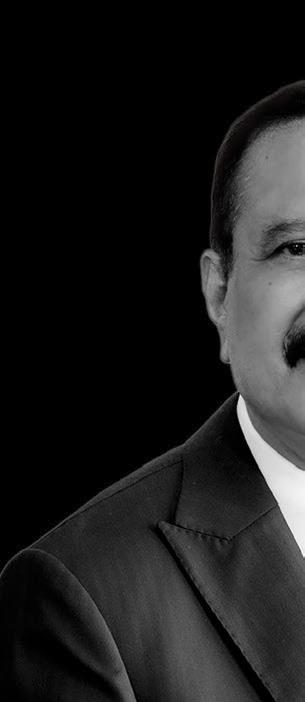


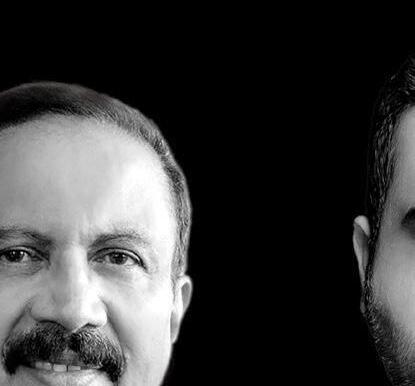






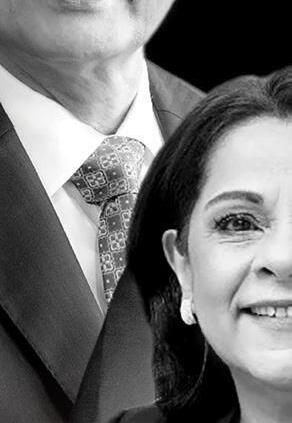


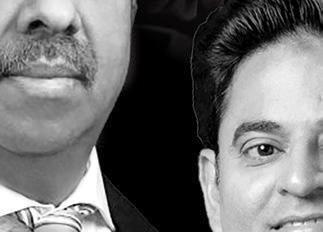
















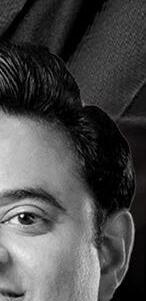








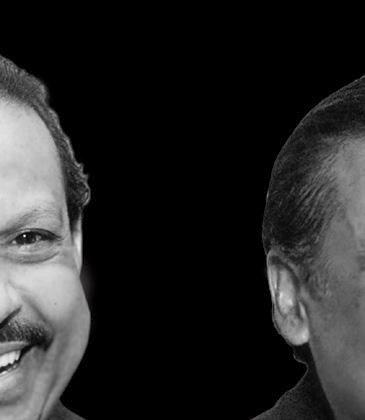





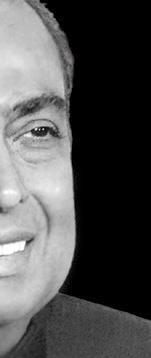






























































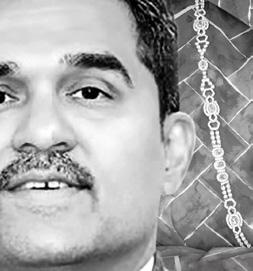





















































































































































































































2024
























FROM CAPTAINS OF INDUSTRY TO VISIONARY ENTREPRENEURS, WE REVEAL THE INDIAN MOVERS AND SHAKERS WHO HAVE MADE A MARK ON THE GCC AND BEYOND







P.26 GOING DIGITAL: How the region’s neobanks are fundamentally reshaping the financial services sector P.30 WHERE THE FUN BEGINS: How Dubai Holding Entertainment is




















An insight into the news and trends shaping the region with perceptive commentary and analysis




















Our listing showcases key Indian industrialists and corporate leaders who are shaping the region’s economic landscape

Tim Cordon, COO – MEA & SEAP, Radisson Hotel Group, shares the group’s regional expansion strategy and achievements
Editor-in-chief Obaid Humaid Al Tayer
Managing partner and group editor Ian Fairservice
Chief commercial officer Anthony Milne anthony@motivate.ae
Publisher Manish Chopra manish.chopra@motivate.ae
Group editor Gareth van Zyl Gareth.Vanzyl@motivate.ae
Editor Neesha Salian neesha.salian@motivate.ae
Digital editor Marisha Singh marisha.singh@motivate.ae
Senior feature writer Kudakwashe Muzoriwa Kudakwashe.Muzoriwa@motivate.ae
Senior art director Freddie N. Colinares freddie@motivate.ae
Senior art director Olga Petroff olga.petroff@motivate.ae
General manager – production S Sunil Kumar
Production manager Binu Purandaran
Production supervisor Venita Pinto
Senior sales manager Sangeetha J S Sangeetha.js@motivate.ae
Digital sales director Mario Saaiby mario.saaiby@motivate.ae
Group marketing manager Joelle AlBeaino joelle.albeaino@motivate.ae

HEAD OFFICE: Media One Tower, Dubai Media City, PO Box 2331, Dubai, UAE, Tel: +971 4 427 3000, Fax: +971 4 428 2260, motivate@motivate.ae DUBAI MEDIA CITY: SD 2-94, 2nd Floor, Building 2, Dubai, UAE, Tel: +971 4 390 3550, Fax: +971 4 390 4845 ABU DHABI: PO Box 43072, UAE, Tel: +971 2 677 2005, Fax: +971 2 677 0124, motivate-adh@motivate.ae SAUDI ARABIA: Regus Offices No. 455 - 456, 4th Floor, Hamad Tower, King Fahad Road, Al Olaya, Riyadh, KSA, Tel: +966 11 834 3595 / +966 11 834 3596, motivate@motivate.ae LONDON: Acre House, 11/15 William Road, London NW1 3ER, UK, motivateuk@motivate.ae
Image credits for cover story: Getty Images, LinkedIn, Wikipedia, Arabian Knight, Jumbo Group, Mulk International, VFS Global, Aditya Birla Group; ArcelorMittal, HCL Technology, Reliance Industries, Wipro, Sun Pharmaceutical, Boston University, Rivoli Group, Devyani International, Jindal Steel









































































IIndia and the Gulf states share a long history, with both benefiting over many generations when it comes to trade and commerce.
Historians say the world’s first-ever trade route was between the Indus Valley Civilization and that of Dilmun, which was located on the island of Bahrain and the shores of Saudi Arabia around 2000 BC.
Historical artefacts have demonstrated that traders from Dilmun stayed for extended periods in South Asia and vice versa.
Fast-forward to the 20th and 21st centuries and the relations between the two regions have remained steadfast. Today, the GCC is India’s largest regional-bloc trading partner, according to the International Institute for Strategic Studies (IISS).




Trade with the GCC comprised 15.8 per cent of India’s total trade in 2022 and 2023,




MILLIONS OF INDIAN EXPATRIATES HAVE MOVED TO THE GCC, NOT ONLY CONTRIBUTING TO THE REGION’S FAST-GROWING ECONOMIES BUT EVEN BUILDING MULTI-BILLION DOLLAR BUSINESSES.”
compared to 11.6 per cent of its total trade with the European Union, according to the IISS.

Another sign of these strong relations is evidenced by the fact that millions of Indian expatriates have moved to the GCC, not only contributing to the region’s fast-growing economies but even building multi-billion dollar businesses in the process.
Others have climbed the corporate ladder to become key captains of industry.
In this month’s edition, we acknowledge these icons of influence and movers and shakers in our special report on the most influential Indians in the GCC. The feature is timely as India is also celebrating its Independence Day on August 15.
You can read this special feature from page 35 onwards. I hope you enjoy it.







Gareth van Zyl, group editor








GCC sovereign funds are on a global expansion spree, targeting diverse sectors and geographies, with India, China and other Asian nations on the radar
BY KUDAKWASHE MUZORIWA
Sovereign wealth funds from the GCC region have capitalised on the recent energy revenue windfall to enhance their global presence. The funds use these external surpluses to expand their investments across various sectors in international markets.
GCC state-owned investors use part of the additional inflows to make strategic investments in advanced and emerging market economies across the Americas, Europe and Asia. The sovereign funds reached their highest levels of global dealmaking in about 15 years, in the first half of 2024, deploying $38.2bn across 58 different deals, according to the latest data from consultancy GlobalSWF.
The trend indicates a notable change in the global investment landscape. GCC sovereign funds, notably Saudi Arabia’s Public Investment Fund (PIF), Abu Dhabi Investment Authority (ADIA), and Qatar Investment Authority (QIA), accounted for 54 per cent of the $96bn deployed by sovereign funds—the highest rate since 2009.
The wave of dealmaking by the Gulf sovereign investors began with the outbreak of the Covid-19 pandemic. Once sleepy government-holding companies, the funds are emerging as investment vehicles with global ambitions.
PIF remained the most active sovereign fund in the world in the first six months of the year, fuelled by government asset transfers. Saudi Arabia’s $925bn sovereign fund and private equity group Ardian agreed to acquire a 22.6 per cent and 15 per cent, respectively, stake in London Heathrow Airport for $4.3bn (GBP3.3bn). QIA currently owns a 20 per cent stake in the UK hub.
PIF also agreed to take a 49 per cent stake in Rocco Forte Hotels last December. The luxury hotel chain
operates in Italy, Britain, Germany, Belgium and Russia.
Similarly, Abu Dhabi’s Mubadala joined Global Infrastructure Partners in May to invest in industrial chemical producer Perdaman’s $4.2bn (AUD6.4bn) Western Australia Urea project. The fund also made a cornerstone investment in PAG’s Asia Pacific renewable energy platform, its first investment in Japan’s clean energy sector.
Qatar’s sovereign fund also said in May that it plans to make an anchor investment in Ardian Semiconductor, a fund set up by private equity firm Ardian to invest in the semiconductor industry.
The foreign investments of GCC sovereign funds have strengthened their substantial liquidity buffers, ensuring they have the financial capacity to continue acquiring assets worldwide.
THE SOVEREIGN FUNDS REACHED THEIR HIGHEST LEVELS OF GLOBAL DEALMAKING IN ABOUT 15 YEARS, IN THE FIRST HALF OF 2024, DEPLOYING
PIF swung to a profit of $36.81bn (SAR138.1bn) in 2023 compared to a loss of $15.6bn a year earlier, the fund said in a regulatory filing in July, helping the
fund cement its position as one of the biggest state-backed investors in the Gulf region.
The fund’s total revenues more than doubled to $88.3bn last year, while its cash reserves rose to $65 billion from $15 billion as of September
Mubadala, Abu Dhabi’s second-biggest wealth fund, said in its annual report that its assets under management (AUM) rose by 9.5 per cent in 2023 to $302.2bn (Dhs1.11tn).
The wealth fund reported proceeds of Dhs99bn in 2023, a 6.6 per cent year-on-year (YoY) decrease from Dhs106bn a year earlier. This decline was attributed to “divestments of certain legacy assets and capital recycling into priority investment areas.”
Mubadala, which deployed Dhs89bn in sectors including technology, digital infrastructure, life sciences, renewable energy and private credit, said its portfolio mix remained broadly similar YoY, with 38 per cent direct and indirect in private equity, 25 per cent in public markets and 16 per cent in real estate and infrastructure.
Though other GCC sovereign funds operate in secrecy, making it hard to ascertain the exact size of their portfolios, the Kuwait Investment Authority is reportedly on track for one of its best fiscal years on record amid a broad market rally.
The most recent data from Global SWF indicates that the total amount invested by sovereign funds from Saudi Arabia, the UAE, Qatar, Kuwait, Oman, and Bahrain has decreased in absolute terms. However, as a portion of total state-controlled investment globally, it has increased significantly.
Looking ahead, GCC sovereign funds, which now manage $4.1tn in combined AUM, are set to play an even more prominent role in global markets. Often referred to as the “new bankers to the world,” the funds have emerged as a vital source of capital for struggling Western assets needing fresh investments.

With a growing preference for personalised and immersive in-store experiences, the region is poised to lead in the integration of advanced technologies and omnichannel approaches



As companies worldwide strive to create engaging interactions, the Middle East has emerged as a dynamic region where innovative customer experience (CX) strategies are redefining the retail landscape. The Middle East o ers unique opportunities for brands to connect with their audiences in meaningful ways and it has been evident that personalised in-store experiences are expected to account for over 78 per cent of the region’s total sales by 2025, according to Statista. It is clear that there is a high preference for luxury and innovation in this region, in which interactive retail displays are particularly impactful. Observing the preferences of a new generation of consumers, several key trends are redefining the shopping experience today. These trends include leveraging physical stores to enhance CX, balancing in-store and online interactions for the new generation shopper, and adopting key trends from global markets. Utilising a balance between trends in the Middle East and taking influence from global market trends can empower CMOs to cra t
strategies that resonate with local audiences while embracing global best practices. A report from Dubai-based Commercial Real Estate Consultants revealed an over 133 per cent surge in in-person retail transactions and a remarkable 184 per cent increase in transaction value over the past year which showcases the ongoing momentum and sustained importance of the brick-and-mortar in a brand’s marketing and sales mix-store models. Retailers have distinguished themselves by utilising a combination of Bricks and Clicks strategies, luxurious and immersive in-store experiences, and leveraging cutting-edge technologies such as augmented reality and interactive displays.
Experts estimate that 43 per cent of UAE consumers adopt Bricks and Clicks shopping strategies, with 78 per cent of shoppers preferring to see items in a physical store before purchasing them online. As the region continues to innovate and adapt to changing consumer behaviours, the integration of
Edwin Stonestreet, managing director at FeatureMind
interactive in-store technologies and online presence will remain a key driver of success in the retail sector. Additionally, physical stores offer a cost-effective method for conducting market research, enabling retailers to easily observe customer behaviours and purchasing patterns. Recent research indicates that opening a new store boosts website traffic by 37 per cent, along with a surge in online mentions and searches of the brand. The downside of this trend is that attribution becomes much harder, but it is already well understood that enhanced CX drives an increase in average order value and lifetime customer value. Experience doesn’t remain just a sales tool, the brand experience needs to be consistent through order delivery, customer service, loyalty engagement and across all channels whether that be in-store staff empowered by digital tools, call centre agents with a 360-degree view of the customer, AI-driven next best action (NBA) prompts or social media interactions. Stitching these threads together and delivering consistency is the nirvana for brands and requires a real focus on how data is managed, exposed and consumed across the business, tying into our philosophy of #FreeTheData.
Additionally, system integrators play a crucial role in seamlessly integrating technologies like augmented reality and in-store interactive displays, ensuring a holistic customer journey that leaves a lasting impression. Overall, consumer behaviour and market dynamics create a fertile ground for leveraging these technologies in ways that might differ from global trends.
Viewing the global market through a wider lens, retailers have prioritised digital transformation and omnichannel strategies to unify online and offline channels and deliver consistent CX. The rise of social media as a shopping platform, where the convergence of commerce has transformed these networks into virtual malls. Over 41 per cent of consumers in the US now seek a smooth transition from browsing on social media to making purchases. Additionally, the adoption of AI and machine learning in managing customer experiences is

gaining momentum, presenting both opportunities and challenges. These technologies allow businesses to analyse extensive data and make informed decisions that enhance customer interactions. However, retailers must strike a balance between leveraging AI capabilities and preserving human touchpoints to ensure that technology enhances rather than replaces genuine human connections.
In Asia, the pandemic has accelerated a dramatic shift towards online shopping, permanently altering consumer behaviour. A study by Amazon highlights the savviness of Asian consumers, who extensively research online and explore multiple retailers before making a purchase. Over two-thirds of shoppers in Asia use both online and physical stores to find the best deals, emphasising the importance of an omnichannel approach. In Europe, online shopping has become the norm, with 68 per cent of Europeans shopping online at least once a week, according to a PwC study. European consumers are increasingly influenced by trends such as digital wallets, augmented reality, and buy now, pay later options, requiring brands to deliver a complete endto-end personalised experience that meets customer expectations. The Middle East is at the forefront of adopting omnichannel CX strategies, blending the best of physical and digital retail. By embracing these strategies, CMOs can redefine CX tactics in the Middle East, creating meaningful and lasting connections with their audiences while drawing on global insights to stay ahead in the competitive retail landscape, but only if they are able to “free the data” can they execute this strategy.
PERSONALISED IN-STORE EXPERIENCES ARE EXPECTED TO ACCOUNT FOR OVER 78 PER CENT OF THE REGION’S TOTAL SALES BY 2025

Cross-sector partnerships are crucial in closing the gaps that often exist between entrepreneurs and the resources they need, including access to networks, raising capital and mentorship
For large-scale innovation to take place, it takes a group with diverse perspectives, engaging in multiple discussions, combining various skills, leveraging a mix of resources, uniting ideas, and fostering a shared appetite for progress.
The Middle East is at a pivotal stage in its innovation journey. On one end of the spectrum, we have future-forward technologies, such as AI, energy systems and EVs, playing an important role in this region’s sustainability drive. On the other
end, we have the agents of collaborative innovation – startups, corporations, business expansion platforms, and governments – driving the growth of the sustainability sector.
It’s a great lens through which to view the future role of the Middle East, too, because this part of the world is increasingly generating excitement about innovation, collaboration, and tangible investment.
Governments have embraced their role as connectors and investors. Saudi Vision 2030 is guiding the kingdom’s initiatives to support entrepreneurs and the start-up ecosystem as part of its diversification strategy.
Meanwhile, the Dubai Future District Fund has allocated 20 per cent of the fund to help accelerate sustainable technology start-ups and scale-ups that
THE AGENTS OF COLLABORATIVE INNOVATION – STARTUPS, CORPORATIONS, BUSINESS EXPANSION PLATFORMS, AND GOVERNMENTS – ARE DRIVING THE GROWTH OF THE SUSTAINABILITY SECTOR
are tapping into advanced technologies such as AI, blockchain and robotics. Incentives and initiatives for SMEs and venture capitalists who are making waves in the green economy are a great way to bolster innovation.
Collaboration and innovation within the sustainability space are taking a lead role in creating impact and driving change. This is timely, too, because many of the most exciting opportunities that presently exist in the Middle East genuinely depend on the contributions of multiple private sector partners to drive momentum and progress.
For example, the Mega Green Accelerator Program saw the collaboration of PepsiCo, SABIC, and AstroLabs with other strategic partners to nurture some of the region’s next generation of innovators as they develop solutions to address sustainability challenges. It offers support and investment for innovation that can bring scalable impact to areas like the circular economy, clean energy transitions, water, and agriculture.
Cross-sector partnerships are helping drive sustainability and address climate change. In this case, it’s also helping bridge gaps that often exist between entrepreneurs and the resources they need, including access to networks, raising capital and mentorship on what to do next or where to prioritise.
With the Middle East becoming a testbed for innovation by attracting an influx of international and regional businesses, creating an environment for these companies to be able to scale into local markets has become essential.
To this end, the collective effort between private and public entities can be looked at as a solution to accelerate development, cater to the needs of these companies, and bridge fundamental gaps. It’s


Eugene
Willemsen, CEO, MEASA and International Beverages, at PepsiCo; and Roland Daher , CEO at AstroLabs
SAUDI’S
also important to showcase sector challenges and emphasise that sustainability is key to the continued future prosperity and success of the Region.
The regulatory environment will continue evolving to further support this – balancing risk with reward, incentivising R&D and accelerating targeted investment in innovation infrastructure.
There must also be more knowledge sharing, insight transference, and education enhancement — particularly around efforts to be more innovationfocused and lasting. Partnerships with educational institutions, too, to imbibe an entrepreneurial mindset from a young age can go a long way.
Finally, regional platforms and events can help provide entrepreneurs with access to global markets, networks, investors, content, connections, and other innovators, closing the loop on continuous crosssector collaborations. This year’s LEAP was a giant success, with record investments into Saudi Arabia’s tech and startup landscape.
With more than $14bn in public and private sector technology sector investments announced at the event, the long-lasting impact of events like LEAP will significantly boost domestic technology infrastructure and propel multi-vertical upskilling and talent incubation opportunities for the region’s entrepreneurs.
Similarly, the UAE’s commitment of $30bn in catalytic capital at COP28 launched a landmark climate-focused investment vehicle and also catalysed global sustainability investment by driving efforts to create a fairer climate finance system.
The foundations for the Middle East becoming a testbed for innovation are very strong. The rest is up to us, and it’s possible if we keep on collaborating in meaningful ways.

The region’s wires and cables industry is spearheading innovative initiatives to mitigate its environmental impact
In 2023, amidst escalating climate threats, fossil fuel emissions hit a peak before embarking on a terminal decline, marking a turning point which the UN Climate Change Conference (COP28) termed “the beginning of the end of the fossil fuel era”, demanding urgent action toward a net-zero future. In lieu of that, the GCC nations are leading the change to renewable energy, with countries like the UAE and Oman aiming for net-zero emissions by 2050, while Bahrain, Kuwait, and Saudi Arabia are targeting 2060 to achieve the same.
While most industrial companies worldwide are aiming to reduce their carbon footprint, this trend is particularly evident in the wires and cables sector.
As the backbone of modern infrastructure, this industry plays an essential role in powering our homes, businesses, and communities. Hence, their transition from the use of fossil fuels to more ecofriendly methods will be a game changer in this shift to cleaner energy sources.
With an approach focused on ending the use of fossil fuels, the wires and cables industry is spearheading innovative initiatives to mitigate its environmental impact. Manufacturers are embracing digital tools such as IoT, data analytics and artificial intelligence to better their operations by enhancing efficiency and potentially minimising carbon emissions.
Additionally, the concept of a circular economy is also gaining traction. Instead of the “take-make-dispose” methods, manufacturers are opting for designing products for longevity and promoting recycling which in turn significantly reduces waste generation.
Mohammad Almutawa, group CEO of Ducab

COMPANIES ARE INCREASINGLY EMBRACING INTERMODAL TRANSIT, WHICH COMBINES THE CONVENIENCE OF TRUCKS WITH THE EFFICIENCY OF RAIL TRANSPORT WHICH CAN CUT CARBON EMISSIONS BY OVER 65 PER CENT PER 1,000 SHIPMENT MILES
In the GCC, UAE has taken on the mantle to reduce emissions by 19 per cent by 2030, compared to the 2019 level, which in turn will represent a 40 per cent decrease from estimated 2030 emissions.
One of the most effective strategies for manufacturers to lead the way in this clean energy era is by enhancing energy efficiency.
Upgrading equipment, optimising production processes, and implementing smart energy management systems, can significantly reduce energy consumption and carbon emissions while also cutting costs.
Leading companies across the globe have already begun opting out of fossil fuels and using more renewable sources. Solar cables have begun garnering attention in Indian enterprises due to their costsaving benefits and reduction of greenhouse gases.
Swedish companies have introduced low-carbon aluminium and polyolefins which produce a carbon footprint of 4kg CO2 per kg aluminium which is less than a quarter of the global average.
Moreover, solutions such as incorporating recycled materials, breaking down wires and products into raw materials to then resell, and adapting recycled plastic from the coaxial waste to use for other industries like construction are all expected to quickly become the norm.
GCC countries have been investing heavily in sustainable sources with UAE being the first country
to pledge to cut carbon emissions by 23.5 percent, equal to 70 million tonnes by 2030. The country has been funding clean energy projects, including solar, wind and nuclear, as it cuts down the use of natural gas for electricity production.
Saudi Arabia comes second as the country ready to achieve net zero emissions by 2060 by focusing on the domestic electrical vehicle market to support its local manufacturing sector as part of its Vision 2030 strategy. On a similar note, major enterprises worldwide are intensifying efforts to minimise carbon footprints through supply chains with innovative strategies.
Switching to sustainable aviation fuel and favouring rail transport over roads is one of the top solutions for sustainable supply chains. Companies are increasingly embracing intermodal transit, which combines the convenience of trucks with the efficiency of rail transport which can cut carbon emissions by over 65 per cent per 1,000 shipment miles. Etihad Rail, one of GCC’s largest rail projects, acts on this by connecting UAE to its neighbouring countries and linking the core industries across the country, thus improving energy efficiency and ceasing a large per cent of carbon emissions on the road. In conclusion, industrial companies that are committed to reducing the use of fossil fuels are at the forefront of this monumental shift.
By embracing renewable energy, harnessing innovative technologies, and prioritising sustainable practices, these companies are not only safeguarding the environment but also signalling the end of an era that once gave rise to the world’s industrial revolution. The companies that adapt to this change first will be the leading example, paving the way for a cleaner and greener future where mankind and the earth can work hand in hand.
MANUFACTURERS
ARE
EMBRACING DIGITAL TOOLS SUCH AS IOT, DATA ANALYTICS AND ARTIFICIAL INTELLIGENCE TO BETTER THEIR OPERATIONS BY ENHANCING EFFICIENCY AND POTENTIALLY MINIMISING CARBON EMISSIONS. ADDITIONALLY, THE CONCEPT OF A CIRCULAR ECONOMY IS ALSO GAINING TRACTION.

From improving operational efficiency to offering personalised dining discovery, AI is redefining the dining landscape
In the artificial intelligence (AI)-driven era of personalisation, restaurants that don’t adopt this technology may seem outdated and inconvenient, losing customers to competitors who offer seamless experiences. The restaurant industry, once primarily driven by culinary talent and hospitality, is now facing a new frontier. In an age where personalisation and convenience reign supreme, AI is becoming a crucial tool for survival in the food and beverage (F&B) sector. With the advent of this technology, the landscape of dining is transforming, promising enhanced customer experiences and streamlined operations.
Restaurants today grapple with numerous challenges, from managing inventory and labour costs to

ensuring consistent quality and customer satisfaction. Traditional methods often fall short in addressing these issues efficiently. One of the significant pain points is the ability to personalise the guest experience at scale. Customers increasingly demand experiences tailored to their preferences, whether it’s dietary restrictions, preferred seating, or personalised recommendations. Moreover, the industry struggles with operational inefficiencies. From long wait times to inaccurate order processing, these hiccups can detract from the overall dining experience. As Dr Susan Wachsmuth, professor of hospitality management, at Johnson & Wales University, states, “As AI continues to develop, restaurants that can leverage it to create a frictionless dining experience – from mobile ordering to automated table service –will be the ones that win in the future.”
YOU COULD TYPE “I WANT A CLUB SANDWICH NEAR ME FOR UNDER DHS30” AND INSTANTLY RECEIVE RELEVANT RESULTS
Artificial intelligence has the potential to revolutionise the F&B industry by addressing these pain points head-on. Through data analysis and machine learning, AI can offer unprecedented insights into customer behaviour, preferences and trends, enabling restaurants to tailor their services like never before.
As Satya Nadella, CEO of Microsoft, aptly puts it, “AI can personalise the guest experience at every touchpoint, from reservations to recommendations to loyalty programs. This can dramatically improve guest satisfaction and revenue.”
One of the most transformative aspects of AI in the F&B industry is its ability to facilitate personalised
Matthew Davidson, CEO of Places, a dedicated F&B discovery app
dining discovery. Imagine searching for exactly what you’re craving with ease. AI enables users to find dining options tailored to their exact requirements, whether it’s a specific dish, price range, or amenity. For instance, you could type “I want a club sandwich near me for under Dhs30” and instantly receive relevant results.
Discounts have proven to have little long-term retention effect, as customers often hop from place to place seeking the next best deal. In contrast, AI offers tools that allow restaurants to be discovered based on a multitude of factors. Whether it’s the area, cuisine type, menu items, or amenities such as rooftop seating, kids play areas, valet parking, and more, AI-driven search ensures customers find precisely what they want.
Imagine being able to find multiple dishes at one restaurant and then deciding whether to dine in or get delivery. AI also supports dietary and allergen preferences, allowing users to exclude certain items from view, making menus easier to navigate based on individual needs.
Artificial intelligence can also help users discover events, such as quiz nights or brunches, and provide suggestions based on social preferences. For instance, it can show you what your friends like and suggest restaurants that are compatible for everyone in the group. It understands your past preferences, places you’ve been, and places you want to try, ensuring every dining decision is informed and personalised.
DISCOUNTS HAVE
PROVEN TO HAVE LITTLE LONG-TERM
RETENTION EFFECT, AS CUSTOMERS OFTEN HOP FROM PLACE TO PLACE SEEKING THE NEXT BEST DEAL. IN CONTRAST, AI OFFERS TOOLS THAT ALLOW RESTAURANTS TO BE DISCOVERED BASED ON A MULTITUDE OF FACTORS. WHETHER IT’S THE AREA, CUISINE TYPE, MENU ITEMS, OR AMENITIES SUCH AS ROOFTOP SEATING, KIDS PLAY AREAS, VALET PARKING, AND MORE, AI-DRIVEN SEARCH ENSURES CUSTOMERS FIND PRECISELY WHAT THEY WANT.
In a world where everyone values speed and accuracy, AI delivers results quickly and tailored to exact requirements. Businesses that harness this technology will flourish by providing seamless, personalised experiences. Those that don’t may find themselves left behind, missing out on the advantages of AI-driven discovery.
This shift is reminiscent of the early days of the internet when businesses first adopted websites and became discoverable by search engines. The ones that embraced this change won. Similarly, restaurants that adopt AI today will set themselves apart, providing unmatched experiences in a highly competitive market.

As climate change intensifies, the vulnerability of our infrastructure becomes increasingly apparent. To address this, a multifaceted approach to resilient architecture is essential, combining engineering, environmental, and policy measures
Climate change constantly reminds us of architecture’s vulnerability to natural calamities and its need for adaptability. It has underscored the need for infrastructure capable of withstanding year-round and evolving weather conditions, indicating that our current building practices must evolve to meet the challenges posed by a changing climate.
Building resilience goes beyond prevention; it requires a multifaceted approach that combines engineering, environmental, and policy measures to prevent and anticipate. It is not enough for buildings to be visually appealing; they must also be robust and prepared to endure the unpredictable and evolving
forces of nature. The integration of innovative design principles and technologies can transform our built environment, ensuring it remains safe, functional, and sustainable even in the most adverse conditions.
Resilient architecture is a proactive approach to future-proofing our cities, especially those across the MENA region now exposed to increased rainfall as well as rising temperatures and humidity levels compared to previous decades. By adopting strategies that enhance the durability and adaptability of structures, we can protect human lives, minimise environmental impacts, and secure the economic stability of our communities as we experience the impact of climate change in our region. This shift in design philosophy involves a comprehensive rethinking of how we construct and maintain our buildings, from the materials we use to the technologies we incorporate.
Resilient and disaster-resistant structure design is a proactive approach to mitigate the potential risks and damages caused by catastrophic events. It involves implementing innovative architectural and engineering techniques to ensure that buildings and structures can withstand and recover from various hazards. One of the key benefits of resilient design is its transformative ability to enhance the safety and wellbeing of occupants. By incorporating strong, innovative materials, advanced structural systems, and smart technologies, buildings can better resist the destructive forces of nature, providing a secure and comfortable environment for people.
Achieving this vision requires a concerted effort from various stakeholders, particularly architecture and design firms, which play a pivotal role in shaping the built environment.
There are several measures that architects and developers alike can factor into their blueprints to create spaces in the Middle East that are both aesthetically pleasing and resilient to the impacts of climate change:
Elevation and drainage: One of the most crucial aspects of climate-resilient design is the strategic
elevation of buildings in vulnerable areas to flooding. By raising structures above potential flood levels, architects can significantly reduce the risk of water ingress. Furthermore, incorporating efficient drainage systems into building designs is essential, potentially with backup solutions. These systems must ensure rapid water runoff and prevent accumulation around structures, involving a detailed analysis of the site’s topography and water flow patterns. Advanced drainage technologies, such as permeable surfaces and underground reservoirs, can be instrumental in achieving these goals.
Materials and construction techniques: Special consideration must be given to areas susceptible to extreme weather conditions. Buildings in these zones should utilise materials and construction techniques that enhance resilience.
Measures such as the use of waterproof membranes, sealants, and moisture-resistant insulation are critical in protecting the structural integrity and interiors of buildings. Innovative materials like reinforced concrete, steel, and advanced composites are known for their durability and ability to withstand extreme weather conditions, making them ideal for resilient construction.
Smart technologies: The integration of smart technologies into structural design has revolutionised resilience strategies. The Internet of Things
BY RAISING STRUCTURES ABOVE POTENTIAL FLOOD LEVELS, ARCHITECTS CAN SIGNIFICANTLY REDUCE THE RISK OF WATER INGRESS. FURTHERMORE, INCORPORATING EFFICIENT DRAINAGE SYSTEMS INTO BUILDING DESIGNS IS ESSENTIAL, POTENTIALLY WITH BACKUP SOLUTIONS.
A RESILIENT BUILT ENVIRONMENT NOT ONLY SAFEGUARDS BUSINESSES AND LIVELIHOODS BUT ALSO ENHANCES THE OVERALL QUALITY OF LIFE FOR ALL RESIDENTS

BY BRINGING TOGETHER PROFESSIONALS FROM ARCHITECTURE, ENGINEERING, URBAN PLANNING, AND EMERGENCY MANAGEMENT, DIVERSE PERSPECTIVES CAN BE INTEGRATED INTO THE DESIGN PROCESS
Amir H Greiss, founder and CEO, SharpMinds Consulting Engineers
(IoT) enables real-time monitoring of buildings, allowing for early detection of structural weaknesses or damage. Sensors and data analytics provide valuable insights, enabling engineers to identify potential risks and take proactive measures to prevent further damage. This technological approach ensures that buildings remain safe and functional even in the face of natural disasters.
Interdisciplinary collaboration: An interdisciplinary approach is essential for effective resilient design. By bringing together professionals from architecture, engineering, urban planning, and emergency management, diverse perspectives can be integrated into the design process. This collaboration results in comprehensive solutions that address multiple aspects of resilience. For instance, urban planners can provide insights into zoning and land use, engineers can focus on structural integrity, and emergency management experts can ensure that buildings are designed with disaster response in mind.
Focus on healthcare facilities: Healthcare facilities, particularly hospitals, require special attention in resilient design for patient and equipment safety. Radiology departments, often located in basements or ground floors, are vulnerable to flooding. Strategies such as elevating radiology equipment, creating sealed and waterproofed enclosures, and installing advanced drainage and pump systems are crucial. These measures not only protect sensitive equipment but also ensure uninterrupted medical services during disasters.
Ultimately, a resilient built environment not only safeguards businesses and livelihoods but also enhances the overall quality of life for all residents. By re-evaluating design practices and incorporating climate-resilient measures, architects can play a pivotal role in building a resilient society. Elevating buildings, improving drainage systems, using innovative materials, and protecting critical healthcare spaces are just some of the strategies that can be employed to mitigate the impact of climate change.
THE INTERNET OF THINGS (IOT) ENABLES REAL-TIME MONITORING OF BUILDINGS, ALLOWING FOR EARLY DETECTION OF STRUCTURAL WEAKNESSES OR DAMAGE

Is your company prepared for the future of work? Here’s what could help the transition
The work landscape has experienced a marked shift. With hybrid work becoming the norm for most industries, harnessing the flexibility and opportunity that this brings will be central to unlocking the future of work. But with geographically dispersed teams, building trust, psychological safety, and a high-performance environment becomes paramount.
Not only has the workplace shifted closer to home, but employee expectations have also had to shift. A pitfall of working from home has been employees developing an ‘always on’ mindset. While cutting out the commute and working from anywhere are inherent perks of hybrid work, employees somehow feel as attached to their desks as ever. Understandably, this has led to employees seeking work-life balance. A recent study in the Middle East by international insurance group Zurich, revealed that 84 per cent of respondents would consider a job with the same pay but better employee benefits. This aligns with PwC’s findings, where UAE’s young workforce – particularly Gen Z – values work-life balance, community, flexibility, and freedom of choice. They see themselves as having options and pushing companies to champion mental and physical well-being. Companies that

Ella Fordham, group people officer, Beyond ONE
fail to prioritise these aspects risk losing top talent in a competitive job market. The same PwC survey highlights that 39 per cent of Middle East employees are more likely to job hop compared to 30 per cent reported last year.
The UAE leads the region in hybrid work adoption. However, building trust and psychological safety in a virtual environment can be challenging. Unlike in a traditional office setting where trust develops naturally through daily interactions, hybrid work necessitates deliberate strategies. Trust can be treated as an equation: Transparency + open communication + shared ownership = Psychological safety. This psychological safety is the foundation for a thriving hybrid team, fostering a sense of belonging, risk-taking, and, ultimately, innovation. Open communication is the bedrock of trust. Regular company-wide meetings keep everyone informed and connected and help avoid isolation. However, companies need to go beyond just meetings. Anonymous feedback initiatives and quarterly surveys can fuel co-creation sessions with senior leadership and ensure every voice is heard.
This, in turn, creates a sense of ownership and emotional safety, and empowers risk-taking and idea-sharing. Another way to achieve this is through cross-functional working groups that tackle key organisational challenges. This open dialogue builds trust and strengthens the feeling of being part of something bigger, while subsequently bettering the work environment. This collaborative approach can even be used in more formal settings, such as performance management processes.
Companies need to recognise that people are their greatest asset. Their creativity, dedication, and brainpower are the engines behind success. Organisations need to challenge the status quo by adopting a people-first culture and actively creating environments for people to thrive, both inside and outside the office. This translates to a happier, healthier, and more innovative workforce – a winwin for everyone. Employees that are involved in the business, and not just working for it, will always be willing to create more value. However, a hybrid work environment risks exacerbating the feeling of employee disconnect, which is why building a strong trust equation is fundamental. To be truly prepared for the future of work, organisations need to embrace a people-first approach, earning the trust of their employees and ensuring their wellbeing is a top priority. This will make them feel trusted, valued, empowered and deeply connected to the company’s mission and vision.











Well-known business personality and philanthropist, Dr Ram Buxani, passed away in Dubai on July 8, 2024 at the age of 83.
Born in 1941, Buxani was among the first Indians to settle in Dubai when he boarded a ship at the age of 18 and arrived in the emirate in 1959 to take up a job as an office clerk at ITL.
He climbed the corporate ladder to become chairman of Cosmos ITL group in 2014.
He was a prominent figure in the Indian community amid his role in influencing the Indian government to abolish estate duty in 1985.
As a philanthropist, he was a board member of Al Noor Training Centre for Children with Special Needs, Dubai, and he was connected with various other charitable and voluntary organisations, including the Rotary Club of Jumeirah.
During his notable career, he was a spokesperson of the Non-Resident Indian (NRI) community, and a recipient of the coveted ‘Man of the Year’ award from the Hong Kong based Bharat Ratna magazine. He also received the Shield from the President of India, among many other honours.
As the founder-chairman of the Overseas Indians Economic Forum in the UAE – a prime NRI organisation which recently merged with the Indian Business & Professional Council – Buxani’s involvement extended to institutions such as India Club, Dubai, of which he was the Chairman since 2012.
Motivate Media Group also published his autobiography Taking the High Road. In the book, Buxani recounts his life journey from growing up in Hyderabad, Sind and Baroda to taking a ship to Dubai and embarking on a new career. The book has been reprinted many times and remains available throughout the Gulf and in India where it was also published.
Ian Fairservice, the managing partner of Motivate Media Group and vice chairman of Al Noor, expressed his condolences at Buxani’s passing.
“As a long-term member of the Al Noor Training Centre Board of Governors as well as a prominent Motivate author, and a dear friend, I was extremely saddened to hear of Ram’s passing. My thoughts and prayers are with his family and friends,” said Fairservice.

DURING HIS NOTABLE CAREER, HE WAS A SPOKESPERSON OF THE NON-RESIDENT INDIAN (NRI) COMMUNITY, AND A RECIPIENT OF THE COVETED ‘MAN OF THE YEAR’ AWARD FROM THE HONG KONG BASED BHARAT RATNA MAGAZINE.
In the below excerpts from Taking the High Road, Buxani narrates his journey to Dubai, offering a glimpse into an era when the city was a small village, just beginning its transformation into a bustling hub. You can purchase the full book from BooksArabia.com.
For me, coming to Dubai was the beginning of a new life. That was more than fifty years ago – 18 November 1959 to be precise.
So let me go back to the beginning. I came to know of the vacancy in Dubai from an advertisement in Hindustan, a Sindhi newspaper published in Bombay (now known as ‘Mumbai’). I hadn’t the slightest idea of the place — what it looked like, what opportunities it had to offer and what the living conditions were like. I don’t think I could have located Dubai on a map at the time I responded to that advertisement.
Dubai wasn’t a well-known destination in those days. Not many people came here looking for employment. It was yet to emerge as the El Dorado where you could make money. But for me the advertisement was a godsend. I’d been silently nurturing an ambition to work for a reputed Sindhi company overseas, a company such as Kishinchand Chellaram, which established the famous KC College in Bombay, or KAJ Chotirmall & Company. It so happened that KAJ Chotirmall & Company was a business associate of ITL, the advertiser and my prospective employer in Dubai. I wanted the job abroad because of its financial prospects and even more because of the opportunities it would provide to build my career.
Iboarded the passenger liner, Dara, in Bombay for my journey to Dubai. Travel by sea was more convenient than air because Dubai did not have an airport at the time. Sharjah was the nearest emirate with an airport, but no airline operated regular or direct flights to Sharjah from Bombay or any other
point in India. It wasn’t as if flights were not available if you wanted to travel by air, but they usually followed a circuitous route.
Considering the hassles and logistics involved in air travel, the journey by sea was a far better option. It took only a couple of days more. The British India Steam Navigation Company had been running a regular service to Dubai since 1904, its eye on the lucrative and ever-increasing trade of the emirate. Five ships serviced the route between Bombay and Basra, with stopovers at Karachi, Gwadar – then an independent territory but now under the administration of Pakistan — Muscat, Dubai, Doha, Bahrain and Kuwait.
All five ships had names ending in ‘a’ — Dara, Dwaraka, Daressa, Dumra and Sardhana. Sardhana was so popular among Dubai passengers that a building in Bur Dubai was named after her. That building exists in the textile market even today and is still known by its nickname.

Dubai wasn’t a well-known destination in those days. Not many people came here looking for employment.”
Sometimes I would sit on a deck chair with the vast expanse of the beautiful Arabian Sea around me.”
I was booked tourist class on-board the Dara — in a cabin accommodating just two passengers. The ticket was priced at about 300 rupees while the deck class was more economical at about 100 rupees. Most of the 800-odd passengers — merchants, job seekers and Arabs returning after vacation or medical treatment in Bombay — travelled by deck class. The ship may not have been a luxury liner, but the journey was comfortable.
Sometimes I would sit on a deck chair with the vast expanse of the beautiful Arabian Sea around me. The sunset at sea was a magnificent and unforgettable sight. With only the muted whir of the engine to break the all-pervasive silence, you could spend hours contemplating nature as an artist at work on the huge canvas of the sky descending on the horizon. The splashes of reds, streaks of yellows, sprays of whites and greys merged and mutated like a surrealist painting. The memory of that scene – the reflection of that beautiful sky on the surface of the ruffled water, ringed with a golden glow, still evokes a feeling of longing and nostalgia in me.


Navigating youth employment challenges requires a multifaceted approach that addresses a widening skills gap, lack of experience and solutions to socio-economic barriers
In today’s competitive job market, youth face numerous challenges in securing employment despite their academic qualifications. Increasingly, employers now prioritise skills beyond academic degrees.
According to the World Economic Forum’s Future of Jobs Report 2023 , critical skills include problem-solving, critical thinking, and self-management. Notably, the demand for creative thinking is expected to grow by 73 per cent in the next five years, surpassing that of analytical thinking. The ability to analyse complex issues and develop solutions is crucial in a rapidly changing work environment. Another significant challenge for youth is the lack of experience. Young job seekers often find themselves in a catch-22 situation: unable to gain experience without a job and unable to secure a job without experience. Employers’ preference for candidates with relevant work experience further disadvantages fresh graduates. The 2023 National Association of Colleges and Employers (NACE) survey highlights that many employers prioritise candidates with relevant experience. Networking is vital for job hunting, but youth often struggle to build a professional network. Unlike seasoned professionals, young individuals may have limited connections, making it challenging to access job opportunities and obtain recommendations. The increasing competition in the job market exacerbates this issue. With a growing number of
graduates and limited job openings, young job seekers face fierce competition, leading to discouragement and frustration even among highly qualified candidates. Another hurdle is the mismatch between youth skills and job requirements. Many young individuals have theoretical education but lack practical skills that are in demand by employers. This skills gap hinders their employment prospects. The Future of Jobs Report 2023 underscores that problemsolving skills are highly sought after by employers, with 73 per cent prioritising these skills. Youth from disadvantaged backgrounds face additional barriers, such as socioeconomic status, lack of resources, or discrimination, further complicating their job search. These individuals often struggle to access opportunities and overcome obstacles in the job market.
Addressing these challenges requires a multi-faceted approach:
These opportunities provide valuable hands-on experience, bridging the gap between education and employment. According to NACE, 60 per cent of employers prefer hiring candidates with relevant internship experience. Heriot-Watt University’s career services team notifies students about internships on the university jobs board.
Mentors o er guidance, share experiences,

and help youth navigate the job market. By connecting with experienced professionals, young individuals gain knowledge and confidence, increasing their employment prospects.
These programmes align with international job market needs and focus on communication, teamwork, problemsolving, and leadership skills. Exposure to di erent cultures helps students appreciate diverse perspectives. Heriot-Watt University’s Go Global programme allows students to experience new cultures and develop as global citizens.
Robust career services, including resume writing workshops, interview preparation, and job search strategy guidance, significantly aid job-hunting efforts. Heriot-Watt University Dubai updates students on job fairs and provides circulars on interview preparation and organisational skills.
These programmes encourage entrepreneurial thinking and innovation.
Heriot-Watt University’s EBS Global Incubator programme supports startups, teaching students to identify opportunities, develop business plans, and bring ideas to life. This fosters a culture of innovation valued in many industries. By implementing these strategies, youth can develop the skills and confidence needed to navigate the job market successfully, leading to a more dynamic and capable workforce.
Dr Racquel Warner is director of academic quality, Global College, Heriot-Watt University.





























The GCC region’s banking sector has undergone profound changes as the proliferation of innovative technologies, shi ting customer expectations, and disruptive forces propel the financial services industry forward.
The region is on the brink of banking transformation, propelled by its youthful, tech-savvy population and the need for on-demand and easier-to-access financial solutions. The combination of the aforementioned makes the Gulf region ripe for fintech firms and neobanks, also known as challenger banks, to accelerate growth.
While GCC’s neobank credentials may fall short of those in other financial hubs in Asia and Europe, the region has made considerable progress on its digital banking licensing regime. The sector’s market value is projected to hit $3.45bn by 2026.
Neobanks have reset the paradigm for the traditional banking industry in terms of customer experience, product









WORDS KUDAKWASHE MUZORIWA


innovation, and pricing. Over the years, the GCC region’s digital banking ecosystem has seen the entry of new players, expansion of existing fintech and telecommunication players into digital banking, and incumbent carving out specific digital banking platforms.
“Neobanks have already begun to carve out their space in the GCC region.
Driven by a young and digitally savvy population, supportive legislation, and an increasingly tech-driven economy, their role ahead will only be further enhanced,” says Asad Ahmed, MD and head of Middle East financial services at Alvarez & Marsal
However, strengthening that competitive advantage by capturing a higher share of consumers’ wallets and generating material profits remains a challenge for most neobanks. McKinsey said, in its Building a Winning AI neobank report, that the answer lies in embedding data and artificial intelligence (AI) capabilities extensively across all aspects of neobanks’ operations.
The adoption of AI in the banking sector is maturing, and neobanks are leveraging the technology to launch products at high velocity and seamlessly integrate open banking features. Open banking APIs facilitate the secure sharing of customer data between banks and non-bank financial institutions – a perfect growth catalyst for neobanks.
Neobanks, banks that operate only online and do not have a physical presence, have arrived in the GCC and are here to stay. Moreover, their adoption and that of greenfield banks, which are incumbents’ response to these digital attackers, have soared in the region and are anticipated to persist.
“With endless technological possibilities and digital transformation in banking, neobanks can elevate the customer experience by bridging the gaps in traditional banking and simplifying the





age-long complex banking processes,” according to EY.


Challenger banks’ primary customer value proposition is convenience. They allow customers to open bank accounts, transfer funds, and apply for loans easily and swi tly without having to visit a physical branch. In today’s digital-first world, new digital players such as Ruya are shaking up the market and transforming banking for individuals and companies. Ajman-based Ruya, a digitalnative Islamic community bank, is the latest challenger bank to join the UAE’s buoyant digital banking ecosystem a ter it secured preliminary approval from the Central Bank of the UAE as a ‘specialised bank’ earlier this year.
Abu Dhabi-based Wio Bank is one of a handful of neobanks that has reached scale and profitability in today’s uncertain environment by focusing on specific characteristics and capabilities in their strategic and execution plans.
Founded in September 2022, the state-owned neobank reported a fullyear profit of $544,588 (Dhs2m) and revenues of Dhs266.4 m in 2023, marking its first full year of operations since its establishment. It also registered a significant increase in customer base across small and medium enterprise (SME) and retail sectors, with more than 50,000 Wio Business and 40,000 Wio Personal customers.
Wio has partnered with several entities, including the Abu Dhabi Global Market, Khalifa Fund and HUB71, to support and provide startups, freelancers, and SMEs with access to simplified and seamless banking services.
Saudi Arabia’s neobank market has yet to reach maturity, but the kingdom is already showing a growing appetite for alternative banking solutions that allow customers to access banking services without stepping into brick-and-mortar branches. Last year, two of Saudi Arabia’s three licenced challenger banks – D360 and STC Bank – launched in a pilot phase. The GCC region has also seen the birth of several successful digital native banks, including Zand Bank, YAP and Saudi Digital Bank.
Overall, the rise of neobanks in the GCC is transforming the region’s banking landscape, promoting competition, and driving innovation across the sector,
NEOBANKS HAVE ALREADY BEGUN TO CARVE OUT THEIR SPACE IN THE GCC REGION. DRIVEN BY A YOUNG AND DIGITALLY SAVVY POPULATION, SUPPORTIVE
LEGISLATION,
AND AN INCREASINGLY TECH-DRIVEN ECONOMY, THEIR ROLE AHEAD WILL ONLY BE FURTHER ENHANCED.”
driven by tech advancements, regulatory support, and customer demand.
Technological advancements are driving the growth of the GCC banking sector, with innovation poised to play a crucial role in transforming the region’s financial ecosystem in the future. Armed with banking licenses, skilled talent, extensive experience, ample capital, and valuable data, innovative incumbents are now on the o ensive.
“Traditional banks are investing heavily in their digital infrastructure to match the flexible and speedy customer-centric approach that neobanks can more easily o er,” says Ahmed.
McKinsey said traditional banks in the GCC have been swi t in adopting new technologies and service models. However, the sector’s long-term outlook continues to hinge on how incumbents respond to disruptive forces emerging both from within and outside the banking industry.
Several incumbents are launching greenfield neobanks to keep pace with evolving customer preferences and access new market segments. Existing players are starting to realise the merits of starting afresh.
Abu Dhabi Commercial Bank (ADCB) launched Al Hilal Digital in 2022. The lifestyle digital exclusive bank o ers family accounts, an e-commerce marketplace, and other ‘beyond banking’ features.
Kuwait’s Boubyan Bank Group launched Nomo, one of the world’s first Islamic digital banks, in 2021. In April 2023, Nomo partnered with ADCB and Al Hilal Bank, giving UAE customers access to UK-based Shariah-compliant multicurrency current and savings bank accounts. Furthermore, Kuwait Finance House (KFH) launched its greenfield digital bank ‘tam’ in October 2023. “tam is not only for completing banking transactions, but it is a substantial leap in digital transformation initiatives, supporting a user experience that aligns with the modern lifestyle of youth,” Khaled Yousef Al Shamlan, CEO of KFH Kuwait said at the launch event.
A successful new greenfield venture can represent a projected 10 per cent or more of its parent firm’s revenue, delivered at a fraction of the cost of traditional products. The banking business is rapidly changing as financial services products and services built on innovative technologies are increasingly being placed in the hands of end customers. Going forward, as banking customers’ behaviours and expectations change, so do financial institutions’ business and operational models.
FOUNDED IN SEPTEMBER 2022, THE STATE-OWNED NEOBANK REPORTED A FULL-YEAR PROFIT OF $544,588 (DHS2M) AND REVENUES OF DHS266.4 M IN 2023, MARKING ITS FIRST FULL YEAR OF OPERATIONS SINCE ITS ESTABLISHMENT






Dubai’s buoyant real estate market is defying predictions of a slowdown, indicating that the Middle East region’s tourism and business hub might be breaking free from its boom-and-bust cycles. The city’s property market continues to showcase strong demand, with the total volume of transactions surging by 44.2 per cent in the year through May to reach 15,766, the highest monthly fi gure on record to date, according to CBRE.
Though much has been said about the influx of new launches and the potential dampening impact that this may have on prices, the absorption of new stock sits at markedly high levels, with the latest data showing that at least 70 per cent of units launched since 2022 have been sold to date.
Here, Kanso talks about Prosper Intl Real Estate’s unique approach to real estate consultancy, the importance of consultancy firms in the real estate sector, and trends driving sustainable investment.
Prosper Intl Real Estate has grown exponentially over the years. Explain how the company has benefitted from Dubai’s booming property market.
Dubai’s property market is flooded with brokerage firms, and Prosper Real Estate
stand out by integrating consultancy services alongside brokerage and investment planning. Over the past two years, the number of individual brokers has surged, with more than 40,000 brokers now in the market.
Our goal is to di erentiate the company by o ering comprehensive consultancy services that build trust and credibility, especially among foreign investors. Consultancy is essential for providing the right advice and building investor trust.
By building trust and attracting the right investors, we support the entire real estate system in Dubai.
What are the real estate agency’s growth priorities, and how do you plan to keep raising its profile in the country?
Our priority is to maintain and strengthen our relationships with our major investors while expanding the company’s reach to include international investors. Simultaneously, we are focusing on business development to grow our market presence.
A critical part of our strategy is investing heavily in our sales advisors’ team. Since they represent the company, we provide extensive training in self-development, motivation, and sales to ensure they perform at their best.
We also emphasise refining our internal processes, particularly our customer relationship management (CRM) and customer service systems. With numerous deals and transactions happening, accuracy is crucial. Therefore, we invest significantly in these systems to ensure smooth and error-free operations.


Dubai has demonstrated remarkable resilience and growth over the years. What trends do you foresee impacting supply and demand in the city’s real estate market?
Our consultancy services cover market research and strategic planning. By understanding investors’ budgets and conducting market studies, we create strategies that maximise their capital appreciation and return on investment (ROI). This approach benefits both developers and investors.
We focus on two main types of investments for our investors: short-term and long-term. Given the varying market conditions, our consultancy ensures the right strategy is employed at the right time.
Prosper follows traditional brokerage methods, including lead generation, digital marketing, and SEO campaigns. However, what sets us apart is our consultancy approach, which many companies lack.
Dubai’s population has been growing steadily over the years. Recently, we have seen waves of international investors coming to the city, and reports indicate an increasing number of millionaires and billionaires – 6,700 and rising. The robust demand in Dubai’s real estate sector has led to a surge in o -plan projects and expansion into new areas, particularly in the south around Al Maktoum International Airport.
New residential and commercial developments are emerging, contributing to a positive impact on demand and supply. This growth is driven by strategic leadership and planning from the Dubai government. The city o ers not just a high quantity of inventory but also diverse, high-quality projects and landscaping.




FERNANDO EIROA, CEO OF DUBAI HOLDING ENTERTAINMENT, GIVES US INSIGHTS INTO THE GROUP’S LANDMARK PROJECTS AND STRATEGIES FOR ENHANCING CUSTOMER EXPERIENCES
BY NEESHA SALIAN
Dubai Holding Entertainment has an expansive and diverse portfolio of parks and destinations. Gulf Business caught up with Fernando Eiroa, CEO of Dubai Holding Entertainment, to learn more about the company’s innovative projects, including Real Madrid World, Global Village and the Coca-Cola Arena, its strategies for enhancing customer experiences, and the core values driving the group’s success.
Entertainment positioned in the market?
Dubai Holding Entertainment is one of the largest diversified entertainment groups in the region committed to solidifying Dubai as one of the most soughtafter tourist destinations in the world. We have an extensive portfolio of assets, parks and destinations, featuring unique experiences and attractions. This year has been particularly extraordinary for
us, with all our assets performing exceptionally well.
Real Madrid World launched in April. Tell us more about it.
Dubai Parks and Resorts is the first theme park destination worldwide to have announced a major partnership with Real Madrid. The world’s first and only Real Madrid theme park celebrates the world’s love for sports and theme parks, presenting a unique adventure that has never been done or seen before. The park hosts more than 40 themed experiences and attractions, including the region’s first wooden roller coaster, the world’s tallest amusement ride, a trophies arena, themed restaurants and retail stores. I see Real Madrid World as an amazing project that mixes entertainment, education, and sport. It encourages young visitors to be active, providing entertainment options where children can
WE HAVE SEVERAL EXCITING PROJECTS THAT WE WILL ANNOUNCE SOON, INCLUDING ENHANCEMENTS TO DUBAI PARKS AND THE REAL MADRID WORLD PARK. OUR FOCUS IS ON AFFORDABLY PROVIDING VALUABLE FAMILY EXPERIENCES, ALLOWING FAMILIES TO ENJOY QUALITY TIME TOGETHER.”
run, play, and get tired. It’s also designed to be an experience that different generations can enjoy together, particularly through sports like football.
How are you promoting the Real Madrid World theme park to the rest of the region and world?
We have a strong partnership with Real Madrid, and we work closely with them to promote the park through various channels. When we announced the agreement, we had over 3.5 billion impressions worldwide, which was phenomenal. We received calls and interest from all over the globe, indicating a significant impact.
Global Village is another key attraction under your portfolio. How did the latest edition perform?
Global Village has performed extremely well, setting another record this year with Season 28. Last season, we welcomed more than nine million guests during Season 27, its highest-ever visitor numbers. Global Village offers a unique multicultural environment with authentic food, products, and diverse entertainment, including laser shows, concerts, and festivals. It’s one of the best entertainment experiences I’ve seen in my career, and I have worked in more than 20 countries. I anticipate that this year’s numbers will also be a recordbreaking one.
Tell us about the performance of the Coca-Cola Arena this year.
Coca-Cola Arena is having another record

year in terms of shows, concerts, and visitation. The quality and size of events have been remarkable, making it a very busy and successful year for us.
What makes Dubai a popular draw for visitors?
Dubai is one of the top tourist destinations in the world, and there are several factors contributing to its popularity. One of the standout aspects is how Dubai welcomes people from all over the world, embracing different cultures. It’s a melting pot of various languages, cultures, and religions, where everyone is made to feel welcome. Another significant factor is that Dubai is one of the safest places in the world. Visitors frequently comment on how safe they feel in the city. Alongside its safety, Dubai offers a beautiful, clean environment with an assortment of experiences, including entertainment options, restaurants, and hotels. The combination of these elements – safety, inclusiveness, and a wide range of attractions – makes Dubai a highly attractive destination for tourists.
What is the strategy for enhancing your offerings and differentiating from the competition?
Maintaining leadership in the competitive
entertainment sector requires a keen focus on understanding and meeting customer needs. At Dubai Holding Entertainment, I believe this means actively engaging with our customers to gather their feedback and preferences. I emphasise the importance of communication, encouraging my team to talk to customers regularly to find out what they want to see in our parks and destinations.
Once we have this information, we work together to create plans that align with customer expectations. Our strategy involves leveraging a robust marketing department, alongside our operations and strategy teams, to ensure our offerings resonate with our audience. By listening to our customers and adapting our services accordingly, we continue to differentiate ourselves and maintain our leadership in the industry.
How are you promoting your destinations during the summer, considering the challenging weather? Authentic theme parks are ideally outdoor, but we understand the summer heat. In Dubai Parks, we have a 60,000-squaremetre indoor building with various attractions. We also offer water parks and indoor attractions like Green Planet, providing a mix of indoor and outdoor experiences.
Are there any upcoming projects our readers can look forward to?
We have several exciting projects that we will announce soon, including enhancements to Dubai Parks and the Real Madrid World theme park. Our focus is on affordably providing valuable family experiences, allowing families to enjoy quality time together.
What are the key values you espouse as a leader; what advice would you give other leaders to help them succeed?
Understanding the market is crucial. Don’t make decisions without understanding it. Know your team and identify their strengths to maximise their potential. Think outside the box and bring in fresh perspectives from other industries. Lastly, promoting gender equality and diversity is essential. These values drive our success at Dubai Holding Entertainment.





TIM CORDON, COO - MEA AND SEAP, RADISSON HOTEL GROUP, DELVES INTO RADISSON’S AMBITIOUS REGIONAL EXPANSION STRATEGIES, THE DISTINCT CHALLENGES AND OPPORTUNITIES ACROSS DIFFERENT
BY NEESHA SALIAN
The Radisson Hotel Group has undergone significant transformation since 2018. Can you shed some light on these changes and the current state of the group? In 2018, we launched a five-year rolling plan setting the foundation for our continued growth. The plan included strengthening our digital and operational platforms, consolidating our brand portfolios, and preparing for accelerated growth. Despite the unforeseen global pandemic, we rode those stormy waters and emerged stronger. Today, we’re seeing the accelerated growth we anticipated, thanks to our robust systems and the trust our hotel owners place in us. This has been crucial for our expansion.
What is the strategy behind the group’s regional expansion, particularly in Saudi Arabia and the UAE?
The Middle East, especially Saudi Arabia,
presents a once-in-a-generation opportunity in hospitality with the region opening up. Currently, we have about 50 hotels in operation or under development in Saudi Arabia, and we see potential for up to 100 hotels over the next five to eight years. We’re committed to this market by establishing a regional o ce in Riyadh. In the broader GCC, our approach is opportunistic, with significant interest in Bahrain, Doha, Kuwait, and Oman. Dubai remains a global market (the third largest hotel market in the world) and continues to show resilience and growth.
Regarding Radisson Group’s growth and expansion in Africa, could you elaborate on the growth you’re targeting over the next few years?
With Radisson Blu, we already hold the position of the largest international brand in sub-Saharan Africa. We are well-established in many key markets,
particularly South Africa, where we currently operate 13 hotels, with a few more set to open in the next year or so. This year, we also launched a wonderful resort in Hoedspruit, marking our entry into the South African safari market. While we remain committed to growth in sub-Saharan Africa, I believe the potential for explosive growth in this region has diminished compared to previous years. We’ve experienced significant growth here and now need to consolidate while continuing to grow organically. Currently, the greatest opportunities for us in Africa lie in Egypt and the French-speaking part of North Africa. Morocco and Tunisia are particularly exciting markets. Our expansion in Morocco has been dramatic, growing from just one hotel five years ago to nine in operation.
Tunisia is also becoming an important market, with several hotels set to open over the next 24 months. Egypt, too, is a fascinating market. Although we’ve operated there for many years, we now recognise the need to realise its full potential and expand aggressively.
As an asset-light company, we manage other people’s assets rather than owning and building hotels. This means we rely on partnerships to identify and seize opportunities. Our role is to maximise the profitability of these assets and deliver the best possible returns for our partners, a task we excel at.
Some markets are more resistant to change and slower to adopt new technologies. It’s essential to respect cultural differences and recognise that people adapt at di erent paces. Strategies need to be flexible and tailored to specific markets rather than assuming one approach will work everywhere. For example, Nigeria is very di erent from Dubai, and we should acknowledge and adapt to these di erences. In terms of market differences, particularly between the Middle East and Africa, it’s crucial to understand that Africa comprises 54 countries,
EACH OF OUR HOTELS IS TASKED WITH PROVIDING UNIQUE LOCAL EXPERIENCES. FROM A TALENT PERSPECTIVE, THE YOUNGER GENERATION DEMANDS A CLEAR VISION AND MISSION FROM THEIR EMPLOYERS. WE EMPHASISE THE ‘WHY’ BEHIND OUR OPERATIONS AND ENSURE OUR EMPLOYEES UNDERSTAND AND ALIGN WITH OUR GOALS.”
each with its own unique identity and cultural heritage.
Morocco, Cameroon and South Africa are as distinct from each other as Dubai is from Kuwait or Nigeria. We must respect these differences, engage with people appropriately, and leverage these unique aspects rather than ignoring them. Our approach is not one-size-fits-all; we adapt to the specific needs and characteristics of each market.As an asset-light company, we manage other people’s assets and focus on maximising profitability for our partners. Our success largely depends on our people. We emphasise diversity and inclusion, especially gender diversity, and have plans to promote women to leadership positions.
Programmes like Accelerate, our leadership development programme, and Spotlight, our sponsorship programme aim to develop female talent and ensure they have opportunities for advancement.
How does Radisson Hotel Group support sustainability in the hospitality sector?
Sustainability has always been a core part of our business, influenced by our Scandinavian roots.
We partnered with the World Travel & Tourism Council on the Hotel Sustainability
Basics initiative to self-regulate and set minimum standards for sustainable operations. This initiative not only enhances our reputation but also increases booking conversions. Our sustainability programme focuses on green operations, green buildings and green energy, ensuring we operate efficiently and use the most sustainable energy sources.
What consumer trends are emerging in the hospitality industry, and how is Radisson adapting to them?
Consumers now seek experiential travel and meaningful experiences rather than just a place to stay. Each of our hotels is tasked with providing unique local experiences. From a talent perspective, the younger generation demands a clear vision and mission from their employers. We emphasise the ‘why’ behind our operations and ensure our employees understand and align with our goals.
How is technology being leveraged to improve customer experience at Radisson?
I can’t talk about innovation without highlighting our website. We’ve translated it into more languages than any other hotel company globally, and it has won numerous awards from the technology sector. While we are a hotel company, our website has received recognition from technology organisations and is the fastest-growing brand web production globally.
CURRENTLY, WE HAVE ABOUT 50 HOTELS IN OPERATION OR UNDER DEVELOPMENT IN SAUDI ARABIA, AND WE SEE POTENTIAL FOR UP TO 100 HOTELS OVER THE NEXT FIVE TO EIGHT YEARS
Our app, awarded by Google and the fastest-growing in the hospitality sector, facilitates communication, bookings, loyalty management, and soon, mobile check-ins. Additionally, our Radisson Awards programme, a groundbreaking loyalty initiative, is now the fastest-growing in the world. These innovations significantly enhance our business operations and the results we deliver to our partners.

Tim Cordon
What can we expect from Radisson Hotel Group soon?
We are committed to constant improvement and growth. By the end of the year and into the next, we will continue to open new hotels and improve our operations. At Radisson, we never stop moving. The only thing that stays constant is our desire to improve. Our business philosophy is not about perfection; it’s about improvement. Constant improvement every single day. Each day, I strive to be slightly better or significantly better than the day before. By continually focusing on improvement, we build momentum, which accelerates our progress and growth. This approach leads to excellence, improved results, motivated teams, and empowered people. We aim for substantial achievements in the coming years, but our primary focus is on how we manage the business today to build the fundamentals that will deliver those future successes. This daily commitment to improvement ensures we are always advancing and setting the stage for longterm growth and excellence.
How do you define leadership, both personally and for the Radisson brand?
Leadership involves building trust, empowering teams, and enabling them to make decisions. It’s about challenging boundaries and encouraging innovation. For Radisson, this means having motivated and empowered people who deliver exceptional experiences. I focus on ensuring we have the right people in the right roles, providing them with the tools they need, and then stepping back to let them lead.
Dr David Wartenweiler, CFA, chief investment officer at Habib Bank AG Zurich, provides insights into the market outlook for the remainder of 2024

Looking at H2, what is Habib Bank AG Zurich’s outlook on the global markets?
Global financial markets
had a strong first half of 2024, but the second half of the year could become more challenging. The Fed may cut rates once, but as long as the US economy expands and inflation stays above 2 per cent, substantial easing is unlikely. Other major central banks may also slow their easing. The US equity market is expensive, and further rises need sustained earnings growth. While full-year S&P 500 earnings growth is likely to exceed 9 per cent, markets will punish companies missing forecasts. Outside the US, we see opportunities in Japan and India but remain cautious about Chinese assets. We favour IT stocks due to their robust fundamentals and business prospects. In fixed income, we see value in investment-grade corporate bonds and select emerging market issuers. Gold remains our preferred hedge against volatility and unexpected US dollar weakness.

market reverberations if there’s a major policy shift by the Bank of Japan, although an internationally coordinated move seems unlikely.
From the bank’s perspective, what’s your take on the state of the GCC economies?
The GCC economies have been relatively stable, and efforts to reduce reliance on fossil fuels in the UAE and Saudi Arabia are likely to sustain economic expansion. Saudi Arabia is becoming a regional power with global reach. Opportunities are likely to abound, but so will poorly designed projects. Investments in private equity and infrastructure are areas investors should explore.
Our geographic presence enables us to ensure we can meet our clients’ needs as they evolve. Our global booking centre, located at our Head O ce in Zurich, is strategically positioned to meet the demands of clients seeking diversification and security. We see an increase in interest from the next generation of our clients, whose expectations and requirements di er from those of the previous generation. This new generation is more focused on innovative financial solutions and sustainable investments. Overall, this trend highlights the need for flexibility and personalised service to meet our clients’ changing needs. In addition to our Zurich o ce, our branch in the Dubai International Financial Centre (DIFC) has been a significant growth driver for us. The DIFC’s strategic location, world-class infrastructure, and business-friendly environment have attracted a multitude of high-net-worth individuals and families from around the globe, the ever-evolving fiscal landscape across developed markets has led to an increased interest in making Dubai a permanent base.
What key risks does the bank see in the global markets in H2 2024?
Disappointing corporate earnings amid stretched valuations could dent equity market performances. If lower earnings result from lower margins, cost pressures could signal a rebound of inflation, making central bankers nervous and ending any talk of Fed easing. Political risks include renewed instability in the eurozone due to French elections and potential volatility from the US elections. The Japanese yen, undervalued currently, may cause global
What is your take on the global energy market, and do you think OPEC+ nations will boost production soon? OPEC+ policy has focused on maintaining a floor for crude oil by managing output. Significant production increases are likely only if strong global demand threatens market stability. While some adjustments are possible, sustained high oil prices (above $100/bbl) would enhance the attractiveness of alternative energy sources and accelerate the energy transition, disadvantageous to established fossil fuel producers.
Where is the bank seeing the biggest growth in its client base?
We remain focused on our HNWIs and ultra HNWIs, particularly, who are seeking to benefit from our wealth management and commercial banking services.
Habib Bank AG Zurich’s presence in DIFC enhances our ability to serve clients in the Middle East and our core markets but also acts as a gateway for international clients looking to capitalise on emerging opportunities in the region. The DIFC’s reputation as a leading financial hub aligns perfectly with our commitment to providing top-tier wealth management services.
Furthermore, our commercial clients have been a substantial contributing factor to our growth. These clients are increasingly looking to capitalise on our offshore wealth services, seeking robust financial solutions to expand and secure their assets globally. The demand for sophisticated banking services, and international investment opportunities, underscores the importance of our comprehensive approach to wealth management.

















INDIAN-BORN ENTREPRENEURS HAVE LEFT AN INDELIBLE MARK ON THE GCC’S ECONOMIC LANDSCAPE. IN THIS LIST, WE PROFILE SOME OF THE WEALTHIEST OF THESE GULF-BASED BUSINESS TITANS, HIGHLIGHTING THEIR JOURNEYS AND ACHIEVEMENTS.
YUSUFF ALI M A CHAIRMAN AND MANAGING DIRECTOR, LULU GROUP INTERNATIONAL

Yusuff Ali MA stands as a towering figure in the GCC business landscape. As the head of LuLu Group International, he oversees one of the largest supermarket chains across the GCC.
Yusu Ali’s journey from a small village in Kerala to the pinnacle of business success began in 1973 when he moved to Abu Dhabi to join his uncle’s small distribution business. Through his leadership, he transformed LuLu Group into a retail behemoth, now operating at over 250 hypermarkets and malls across the Gulf and beyond. His ability to foresee market trends and adapt to changing consumer needs has been instrumental in the group’s expansion and success.
Beyond retail, Yusu Ali’s influence is widely recognised. In April 2020, a member of Abu Dhabi’s royal family acquired a 20 per cent stake in LuLu for $1bn, underscoring the group’s significant market value. This investment highlights the trust and confidence the business community places in his leadership. Looking ahead, he is planning to list the retail business in the second half of 2024. The listing is expected to be on the Abu Dhabi Securities Exchange (ADX) and take place in the second half of the year. The company is also considering a dual listing to include the Saudi Arabian stock exchange Tadawul.
Sunny Varkey, son of Indian expat teachers who migrated to Dubai in 1959, has transformed the landscape of private education in the GCC. From humble beginnings with a single school, Varkey expanded UAE-based GEMS Education into the world’s largest K-12 private education provider, operating more than 250 schools across 13 countries.

Under his leadership, GEMS Education secured CVC Capital Partners as a key investor in 2019, solidifying its financial foundation and supporting further growth. The company is now led by his sons, Dino and Jay Varkey, who serve as CEO and Group Executive Director, respectively, ensuring the family’s legacy continues. Additionally, Sunil Munjal, a member of the prominent Indian Munjal clan, holds a minority stake in the company, reflecting its broad appeal and robust investment potential.

Dr Azad Moopen, founder and chairman of Aster DM Healthcare, started his career as a medical lecturer, Dr Moopen’s journey took a pivotal turn a ter a visit to Dubai, where he saw the untapped potential of the healthcare sector in the Gulf. This led him to relocate to Dubai and establish a single-doctor clinic in 1987. Over the past 37 years, this modest clinic has grown into Aster DM Healthcare, a global healthcare conglomerate with over 896 facilities across seven countries. Today, Aster DM Healthcare has become an integrated healthcare service organisation o ering a complete circle of care through its network of hospitals, clinics, and pharmacies. One of the largest integrated healthcare service providers in the GCC and India,the company employs over 34,239 people, including 4,314 doctors and 9,883 nurses.
Dr Moopen’s daughter Alisha Moopen, who joined the company in 2013, is responsible for managing the strategic direction and development of the company as its group CEO and managing director.
FOUNDER AND CHAIRMAN, BURJEEL HOLDINGS AND CHAIRMAN, AMANAT HOLDINGS
SInce opening his first hospital in Abu Dhabi in 2007, Dr Vayalil has transformed his healthcare group into the UAE’s largest and most prominent private healthcare provider.
Over nearly two decades, he has expertly balanced his roles as entrepreneur, strategist, and philanthropist, elevating healthcare standards across the region.
Starting with a single hospital, Dr Vayalil has grown Burjeel Holdings into a diverse conglomerate that spans hospitals, medical centers, homecare services, occupational health, and retail pharmacies. Under his leadership, brands like Burjeel, Medeor, LLH, Lifecare, Tajmeel and PhysioTherabia have become synonymous with high-quality healthcare in the GCC.
Beyond his business achievements, Dr Vayalil is a dedicated philanthropist. His charitable values, inspired by his upbringing in Kozhikode, India, drive his support for public health, education, and community development initiatives. He is also actively involved in various healthcare and industry boards, including the UAE Medical Council, and has received numerous accolades for his contributions to healthcare excellence and social impact.

DR THUMBAY MOIDEEN FOUNDER PRESIDENT, THUMBAY GROUP

Since Moideen founded the Thumbay Group in 1997, it has evolved from being the first private medical institute into a thriving conglomerate with more than 110 locations across the UAE and partnerships with more than 70 global institutions.
At the heart of Moideen’s achievements is the Thumbay University Hospital in Ajman, a state-of-the-art facility that cost over $272.3m (Dhs1bn) to build and can treat more than 50,000 patients a day. The hospital also features a dedicated department for medical tourism, catering to patients from around the world.
In a recent leap forward, Thumbay launched an AI transformation division last May. This new initiative aims to revolutionise medical education and training, as well as enhance healthcare services through advanced artificial intelligence.
Beyond healthcare, Thumbay has a diverse portfolio spanning more than 20 sectors, including education, real estate, medical research, diagnostics, retail pharmacy, communications, technology, medical tourism, and trading.
YOGESH MEHTA FOUNDER AND CEO, PETROCHEM MIDDLE EAST
Yogesh Mehta moved from India to Dubai in 1990, which marked the beginning of his remarkable entrepreneurial journey. By 1995, he had laid the foundation for Petrochem Middle East, which has since grown into a billion-dollar powerhouse. Today, the company operates a large storage terminal at Dubai’s Jebel Ali port and boasts an impressive annual turnover of over $1.5bn.



From this bustling hub, Petrochem ships more than three million metric tonnes of chemical products each year to 27 countries, focusing on key markets in the GCC, India, and Africa.
With distribution rights for top brands like Shell, Eastman Chemical Company, and LyondellBasell, Petrochem supplies a wide range of industries, including painting, coating, printing, packaging, and oil and gas.
RENUKA JAGTIANI CEO AND CHAIRWOMAN, LANDMARK GROUP
Renuka Jagtiani has firmly established her place as a leading businesswoman in the GCC. As the CEO and chairwoman of Dubai-based Landmark Group, she oversees a vast retail empire boasting over 260 outlets, including department stores, malls, and hypermarkets across more than two dozen countries.
Jagtiani’s journey with Landmark began in 1993, where she quickly gained prominence through her work with Splash, a fast-fashion brand now present in over 200 locations across 11 Middle Eastern and African nations. She played a pivotal role in establishing the company’s presence in India in 1999, which now operates 900 stores under five formats, including Lifestyle, Home Centre and Max.
Taking over a ter the passing of her husband and Landmark’s founder, Micky Jagtiani, in May 2023, Renuka has continued to drive the company forward. Under her leadership, Landmark employs 50,000 people.

PNC Menon’s journey from humble beginnings in India to becoming a notable figure in the regional real estate and construction industry is remarkable.
Menon began his entrepreneurial career in 1976, establishing an interior decoration firm in Oman. His firm, Service and Trade Company, quickly became a market leader, undertaking prestigious projects across Oman, UAE, Bahrain, Qatar, and Brunei. In recognition of his contributions, Menon and his family were granted Omani citizenship in 1995.
A ter decades of success in the Middle East, Menon entered the Indian
FOUNDER AND CHAIRMAN, DANUBE GROUP



Rizwan Sajan has transformed Danube Group into a major conglomerate in the MENA region with over 75 locations and 4,500 employees. Starting as a small trading business in 1993, Danube Group now includes Danube Building Materials, Danube Home, Danube Properties, and other ventures such as Alucopanel Middle East and Starz Media. The group is renowned for o ering over 50,000 products in construction materials and providing a ordable housing options.
Sajan has gone from a disruptor in the real estate market in 2014 in Dubai to launching what will be one of Business Bay’s most iconic towers: Bayz 101. Scheduled to be completed in 2028, the 101-level residential building will be situated within just a two minutes’ walk of the Business Bay Metro Station.
Sajan has also pioneered the affordable luxury property segment in the UAE, supported by a vast logistics and warehousing facility spanning seven million square feet in Jebel Ali Free Zone. He attributes his success to the visionary rulers of Dubai and is committed to sustainability, aligning with Dubai’s ‘2023 – The Year of Sustainability’ initiative.
A philanthropist, Sajan actively supports community welfare, donating Dhs5m to the UAE’s 1 Billion Meals Endowment Initiative and providing 100,000 meals daily during Ramadan.
real estate market in 1995 by founding Sobha Developers in Bangalore. Under his leadership, Sobha Developers went public in 2006, achieving an impressive oversubscription of 126 times. Today, Sobha is a $1.5bn market-cap company with a presence in 24 cities and 13 states across India. Expanding his vision internationally, Menon established PNC Investments in 2011 to bring the Sobha brand to the UAE. His ventures in Dubai include Sobha Hartland, a $4bn luxury mixed-use development, and District One, an $8bn joint venture with Meydan Group. Sobha Realty’s flagship community, Sobha Hartland, now houses over 11,000 residents.

JOY ALUKKAS CHAIRMAN AND MANAGING DIRECTOR, JOYALUKKAS GROUP

Joy Alukkas began his entrepreneurial journey in 1987 when he recognised the immense opportunities the UAE presented. He established his first jewellery showroom in Abu Dhabi, and over the next decade and a half, Joyalukkas Jewellery has grown into one of the most successful jewellery retail chains in the GCC.
In 2002, Joyalukkas strategically ventured into the Indian market, setting up its Indian headquarters and first showroom in Kochi, Kerala. This move marked the beginning of an extraordinary expansion. Today, the group is a multibillion-dollar corporation with an impressive portfolio of jewellery showrooms spread across 11 countries, including the US, UAE, India, UK, Singapore, Malaysia, Qatar, Oman, Bahrain, Kuwait, and Saudi Arabia.
Alukkas has expanded into various ventures such as Joyalukkas Exchange, Jolly Silks, Joyalukkas Gold Tower and Mall of Joy. Furthermore, through the Joyalukkas Foundation, the group aims to support causes for communities in need.
RAJEN KILACHAND CHAIRMAN AND PRESIDENT, DODSAL GROUP

RSIMA VED FOUNDER AND CHAIRWOMAN, APPAREL GROUP

ajen Kilachand is recognised in the business community for his strategic acumen and philanthropic spirit. Armed with a master’s degree from the Boston University Graduate School of Management, Kilachand has steered Dodsal Group to remarkable heights. Under his leadership, the company, which was founded in 1948, has diversified its operations, excelling in sectors ranging from engineering and construction to trading and energy. Kilachand’s vision and tenacity have been instrumental in transforming Dodsal into a global powerhouse.
With a business volume of more than $2bn, Dodsal is one of the leading energy and infrastructure development companies in the world and soon to be an oil and gas, minerals and metals producer. The company’s operations cover the Middle East and North Africa and the Indian Subcontinent with o ces in UAE. Beyond his corporate achievements, Kilachand’s philanthropy extends globally, supporting rural development, education, and women’s empowerment.
Born in Africa and raised in Dubai, Sima Ganwani Ved’s entrepreneurial journey began in the early 1990s when she managed a department in her father’s shopping mall. This early experience set the foundation for her future success. She holds a bachelor’s degree from King’s College London and an MBA in business management, credentials that have equipped her for the dynamic world of retail.
Founded in 1996, Apparel Group started as a single store in Dubai and has grown into one of the largest retailers in the Middle East. The multibillion-dollar company houses over 85 international brands, including Tommy Hilfiger, Aldo, Charles & Keith, Skechers, Dune London, Tim Hortons, Crocs and Rituals. With over 2,200 stores in 14 countries and a workforce of more than 22,000, Apparel Group is a global retail powerhouse.
The company has a strong presence across the GCC, India, South Africa, Singapore, Jordan, Indonesia, Thailand, and Malaysia, with plans to expand into Iraq, Egypt, and the broader African continent.
Firoz Merchant, a prominent Dubai-based Indian businessman, has built a remarkable legacy from humble beginnings. Growing up in Mumbai, Merchant faced significant challenges, including dropping out of school.
At 22, while on his honeymoon in Dubai, he explored the Gold Souq, a visit that would spark his entrepreneurial journey. In 1989, he established a gold trading business in Dubai’s Deira district. Today, that business, Pure Gold Group, employs over 3,500 people, operates manufacturing facilities in China and India.
As the founder and chairman of Pure Gold Jewellers, a leading jewellery retailer with over 120 stores across the Middle East, Merchant’s influence extends beyond business. In recent years, Pure Gold has also diversified into the real estate sector.
PRESIDENT, JASHANMAL GROUP




Tony Jashanmal has been a key figure in the company’s expansion and modernisation. Born in Kuwait and educated in India and Switzerland, Jashanmal joined the family business in 1973 as managing director of the Kuwait operations. His tenure has been marked by significant achievements, including establishing new businesses, driving expansion into India, and forming numerous joint ventures.
The Jashanmal Group, a household name since 1919, operates over 150 retail stores and boasts a distribution network extending to more than 1,000 outlets. The group’s operations include a wide range of products from luggage and home appliances to perfumes, cosmetics, consumer electronics, and print media.
Their key clients are business groups, Duty Free operators, supermarkets, hypermarkets, and department stores. Headquartered in Dubai, the Jashanmal Group also has o ces in Abu Dhabi, Kuwait, Bahrain, Oman, Qatar, Saudi Arabia, and India. Bharat Shiromani Award.

Sunil Vaswani’s Dubai-headquartered Stallion Group started when he took over a Nigerian trading business from his father at the age of 21. The company has grown into a major investor across Africa, with interests in automobiles, commodities, food, and manufacturing. Stallion Group generates the bulk of its $4bn revenue from Africa and includes businesses in commodities trading, frozen foods, and auto assembly and dealerships, representing brands like Nissan, Volkswagen, Audi and Porsche. Vaswani is also expanding Stallion’s African footprint with a $9bn investment in sectors such as steel, petrochemicals, and agriculture. Vaswani has previously been quoted as saying that he views the UAE as a hub for investments and trade flows into and from Africa.

RAVI PILLAI CHAIRMAN AND MANAGING DIRECTOR, RP GROUP OF COMPANIES
RDR
ZULEKHA DAUD
FOUNDER AND CHAIRPERSON, ZULEKHA HEALTHCARE GROUP

avi Pillai, an Indian-born entrepreneur, moved to Saudi Arabia in 1978, and with the assistance of a local partner, he built his business from the ground up, founding the RP Group of Companies. Under his leadership, RP Group has evolved into a multifaceted and diversified global business entity with 20 companies under its umbrella. The group has become a trusted infrastructure partner in the GCC region, executing projects worth over $20bn in the last decade. Their activities span construction and infrastructure, real estate development, hotels and hospitality, healthcare and wellness, education, information technology, trading, and retail.
RP Group is one of the largest employers in the region, with over 85,000 employees.
DVASU
SHROFF CHAIRMAN, REGAL GROUP OF COMPANIES

Dubbed Dubai’s textile king, Vasu Shro built his business empire a ter arriving in the UAE as a hopeful 19-year-old in 1960. He started o the family business with one trading store, and today, the group has multiple companies across the GCC.
Shro ’s ventures span across di erent sectors, including distribution, real estate, manufacturing, technology and investments.
His multi-billion dollar holding firm manages several subsidiaries, including Regal Traders, which primarily focuses on the textile industry; Regal International, a pioneer in sports technology; Regal Technologies, which serves the satellite market; and the Regal Group of Investments, a financial services firm based in Dubai.
Regal Traders, the group’s core business, operates 12 branches across Dubai, Abu Dhabi, and Ras Al Khaimah. Shro is credited for transforming the company into the GCC region’s fabrics powerhouse and laying the foundations for the group’s sustainable success.
Shro , in addition to his business ventures, is a well-known philanthropist. He has supported numerous charitable causes, focusing on education, healthcare and community development. He is on a mission to build 101 temples across the world.
r Zulekha Daud founded the Zulekha Healthcare Group, which includes two multidisciplinary hospitals in Dubai and Sharjah, four UAE medical centres, and three pharmacies. She moved to the UAE in 1964, becoming the first female Indian doctor to practise in the country. In the mid-1960s, she treated the UAE’s Founding Father, Sheikh Zayed bin Sultan Al Nahyan. The group’s facilities treat over 550,000 people annually, making it one of the largest private healthcare providers in the UAE. In 2020, Zulekha Hospital was re-accredited by the Joint Commission International. Dr Daud has delivered over 10,000 babies over her 56-year career and serves as the chairperson of the group, which also includes a hospital in her hometown of Nagpur, India.

RS RAMAKRISHNAN CHAIRMAN, TRANSWORLD GROUP
amesh S Ramakrishnan is the visionary leader behind Transworld Group, a global shipping and logistics powerhouse. With a degree in commerce from the University of Mumbai, Ramakrishnan has over 30 years of entrepreneurial experience, encompassing ship owning, chartering, and ship management. His hands-on approach and deep understanding of the shipping industry have been instrumental in the group’s success.
Ramakrishnan’s journey builds on the legacy of his late father, Sivaswamy Iyer, who founded Transworld Group in 1977. Despite significant visual impairment, Sivaswamy’s determination led to the creation of the group. Ramakrishnan has since expanded its activities and geographic reach from the UAE over the last four decades.



Under his leadership, Transworld Group has grown to a 900-strong team, offering diverse services such as ship owning and management, digital supply chain management, warehousing, agencies, project logistics, and real estate.
VIDYA M CHHABRIA CHAIRPERSON, JUMBO GROUP
Vidya Chhabria has been at the helm of Jumbo Group since 2002, following the demise of her husband of her husband, who founded the electronics giant in 1974. She has been steering the company’s growth since then, scripting the group’s multi-brand strategy and directing its foray into the business-to-business segment.

With more than 2,500 employees, Jumbo is home to more than 60 global brands, including Sony, Dyson, Apple, Samsung, Hisense and Lenovo. The group also offers aftermarket services for 15 categories, including consumer electronics, professional products, durables, home appliances, mobility and IT products.
On the CSR front, Chhabria’s Jumbo donated Dhs1m to Dubai Cares, part of Mohammed bin Rashid Al Maktoum Global Initiatives, bringing the group’s contributions to children’s education to Dhs7m to date.
CHAIRMAN AND FOUNDER, AL DOBOWI GROUP
urender Kandhari’s journey began in 1975 with an exploratory visit to Dubai, which led to the creation of a multinational company with diverse business interests in North and South America, Africa, Europe, Asia, and the Middle East.

The Al Dobowi Group was established in 1976 as the UAE’s first tyre showroom. Over the years, the conglomerate expanded its business to include automotive batteries, auto parts, industrial rubber products and fabrication, motor lubricants, and tyre re-treading.
The group partners with blue-chip companies such as CocaCola, Walmart, and DHL and is the official distributor of Taurus, Riken, Kumho Tire and Hankook brands across the Middle East. Employing over 2,000 people globally, Al Dobowi is also the largest battery manufacturer in the MENA region. In 2012, Kandhari opened a Sikh temple in Jebel Ali, which feeds over 1,500 people daily.
SYED M SALAHUDDIN MANAGING DIRECTOR, ETA ASCON STAR GROUP
Syed M Salahuddin helms ETA
Ascon Star Group, a diversified multinational investment group renowned for its significant contributions to education, society, and community welfare. Established in 1973, ETA is a joint venture between Dubai’s Al Ghurair Investments and Indian businessmen BS Abdul Rahman and Syed M Salahuddin.
Primarily a contracting firm in the UAE, ETA Ascon Star Group has expertise spanning civil construction, electromechanical services, elevator engineering, and facilities management. The firm has completed projects worth over $1.36bn, including notable ventures such as the iconic Burj Al Arab. Under Salahuddin’s leadership, the company now oversees around 75,000 employees across 21 countries.
Beyond his role at ETA, Salahuddin is the founder of Premier Diagnostic, established in 2011. He has also served as chairman-emeritus at Star Health & Allied Insurance and as managing director at ETA MELCO Elevator.
In addition to his corporate responsibilities, Salahuddin is dedicated to community service.
He serves as the president of the Indian Muslim Association, reflecting his commitment to societal development and welfare.
His extensive career and leadership have positioned ETA Ascon Star Group as a key player in the construction and investment sectors, driving significant developments in the Middle East and beyond. His multifaceted roles highlight his versatility and dedication to both business excellence and community service.

CHAIRMAN, NIKAI GROUP
Diplomat-turned-entrepreneur Paras Shahdadpuri founded Nikai Group of Companies in 1995. The global conglomerate evolved from a modest trading enterprise into an international operation within two decades, with diverse business interests in electronics and appliances, information technology, general trading, and food.
Based in Dubai, Nikai boasts over 400 ownbrand products across electronic appliances, home entertainment, and white goods. With direct operations in more than 60 countries and a customer base exceeding 60 million worldwide, Nikai has firmly established itself in some of the most competitive global markets, including the US. The company is now entering a rapid expansion phase into African and Asian markets, particularly focusing on the Maghreb region. Nikai’s excellence has been recognised with ‘Superbrand’ status conferred by the international Superbrands Organization in 2011 and from 2016 to 2018. Paras himself has received numerous accolades, including the prestigious Bharat Shiromani Award.







NARESH KUMAR BHAWNANI FOUNDER AND CHAIRMAN, WEST ZONE GROUP

Naresh Kumar Bhawnani launched his first supermarket in 2005 in Mirdif, Dubai, on UAE National Day. Over the past two decades, the West Zone Group has expanded into various sectors including logistics, shopping malls, real estate, construction, technology, hospitality, and food and beverage across the UAE. Supermarkets and hypermarke remain the cornerstone of the group’s operations, with over 100 outlets spread across more than 500,000 square feet of retail space. Bhawnani oversees a workforce of more than 5,000 employees. The group’s acquisition of the Safestway supermarket chain, along with three Giant branches and one G-Mart from Giant Group, further solidified its market presence. The company, apart from operating hypermarkets, malls, hotels, food and beverage outlets, has divisions in building contracting, real estate, and fashion. With locations nationwide, West Zone Fresh is a household name, providing over 500 products, including its own brands alongside local and global names in groceries, confectionery, and more. Bhawnani has ambitious plans for global expansion. In the coming years, the group aims to extend its presence further across the GCC and beyond.
Kabir Mulchandani’s Five Holdings, a Dubai-based real estate firm, is known for its luxury party hotels and resorts in the Middle East, Spain and Switzerland.

Established in 2011, Five Holdings is set to go public on the Dubai stock exchange in 2025. Mulchandani, originally from Mumbai, India, began his career in his family’s consumer electronics business before relocating to Dubai in the early 2000s to invest in real estate. In November 2023, Five Holdings made a significant acquisition of the Pacha Group, which owns hotels and nightclubs in Ibiza, Spain.
The company’s portfolio boasts three luxury hotels in the UAE – Five Palm Jumeirah, Five Jumeirah Village, and Five Luxe. It also includes Five Zurich in Switzerland, and two hotels in Spain, Destino Pacha and El Hotel Pacha, along with the nightclub Pacha Ibiza.
Additionally, FIVE Holdings owns two fashion lines as well as a private jet experience, a music label, and and Five Music Studio.
Five Holdings has earned an “A” grade ESG rating from ISS Corporate Solutions, the highest across all sectors. This underscores the firm’s commitment to creating a ‘Global Sustainable Entertainment Ecosystem,’ integrating immersive entertainment with innovative F&B concepts, catering to an international and eco-conscious audience of luxury-loving millennials and GenZ customers.
NAWAB SHAJI UL MULK FOUNDER AND CHAIRMAN, MULK HOLDINGS

Nawab Shaji Ul Mulk embarked on his entrepreneurial journey in the UAE in 1982 after he arrived in the country with plans to join his brother-in-law’s business and save up to further his academics in the US.
Today, Mulk Holdings, established by him in 1995 to manage his expanding business interests, owns Alubond USA, an aluminium composite panel brand with investments spanning Europe, Africa, Turkey, India, and the Middle East.
The holding firm’s unit, Mulk International, manages a group of 18 companies and has a diversified portfolio that spans four sectors, including building materials, plastics, health care, and cricket assets.
The Sharjah-based conglomerate started construction of Zim Cyber City, a $500m high-tech park in Zimbabwe, in 2022. The master plan includes 250 townhouses, over 80 luxury villas, apartment blocks, office spaces, a high-end retail arcade, and a 15-storey commercial tower.
Mulk, a member of the Emirates Cricket Board and the 1992 UAE World Cup squad, owns and organises several T10 cricket leagues through T-Ten Sports Management. These leagues include the US Masters T10, Indian Masters T10, Zim Afro T10, Lanka T10, and Abu Dhabi T10.
SOHAN ROY FOUNDER, CHAIRMAN AND CEO, ARIES GROUP
Sohan Roy founded Aries Group, with its flagship unit, Aries Marine, in 1998. The conglomerate has grown exponentially in the Middle East and operates in 25 countries worldwide, with 66 companies.
Over the past 26 years, the group has collaborated with more than 8,243 national and international clients and executed more than 85,312 projects. Last year, the Sharjah-based multinational firm distributed Dhs13.4m employees to mark its silver jubilee.

The group has implemented an array of corporate social responsibility initiatives, including pensions for parents of employees, salaries for unemployed spouses of the company’s employees, homes for senior staff, education allowance and scholarships to the children of the employees.
Beyond his business ventures, Roy is a poet and writer. He has penned five books and has been publishing four-line poems each day without a break on social media platforms over the past five years.

THAKURDAS
CHAIRMAN, CHOITHRAM & SONS
LT Pagarani is a scion of the familyowned business founded by his father, Thakurdas Choithram Pagarani, over 80 years ago in West Africa. The supermarket chain opened its first outlet in the UAE 50 years ago and now operates 50 strategically located stores across the country.
The grocer also has an online presence at choithrams.com, which is supported by online delivery platforms such as Instashop, Talabat, Deliveroo, El Grocer, and noon.
Beyond the UAE, Choithram has a presence in other GCC states, including Bahrain, Qatar, and Oman. The supermarket chain is known for bringing Britain’s Tesco range of products and Ireland’s SuperValu to the UAE’s retail stores. Recently, it partnered with retailer Sainsbury’s to distribute its products in the markets in which it currently operates across the Gulf region.
Choithrams also teamed up with Rove Hotels to open eight convenience stores at various locations throughout the UAE. Pagarani is also the director of export and trading firm Giant Exports, retailer Natco Cash & Carry and telecoms giant Crown Networks.
BHARAT BHATIA FOUNDER AND CEO, CONARES
Bharat Bhatia’s Conares is one of the UAE’s leading steel manufacturers. Under his leadership, the company has achieved an annual turnover of Dhs1.2bn, with ambitions to reach Dh2.2bn.
Bhatia’s entrepreneurial journey began in 1988 with a modest steel trading firm. His leadership transformed it into Conares, a powerhouse in the steel industry with investments totaling $700m.
Today, Conares produces 1.5 million tonnes of steel annually and employs over 900 employees. The company’s manufacturing facilities span 1.5 million square feet, producing steel rebars, pipes, and colour-coated coils. The company’s steel has been integral to major UAE projects, including Etihad Rail and Expo 2020.
Bhatia’s business ventures extend beyond steel into the food and beverage and real estate sectors, showcasing his versatile entrepreneurial spirit.

Apart from his business pursuits, Bhatia plays a pivotal role in the industry and community. He serves as the chairman of the Steel Manufacturers Group (SMG) and the Conares Foundation. Additionally, he actively contributes to the Indian Business and Professional Council (IBPC), Business Leaders Forum (BLF), and the Steel Users Federation of India (SUFI).
CHAIRMAN,
ALAM STEEL GROUP
SMOHAN VALRANI FOUNDING SENIOR VICE CHAIRMAN, AL SHIRAWI GROUP

Mohan Valrani arrived in Dubai in 1966 with just $10. More than half-a-century later, he commands an array of businesses in sectors such as oil and gas, logistics, education and more. Valrani’s entrepreneurial spirit led him to partner with Abdulla Al Shirawi in 1971 to form the Al Shirawi Group, which would grow to encompass over 30 leading companies across various industries.
The Al Shirawi Group expanded rapidly under Valrani’s leadership. In 1974, the group ventured into printing with the establishment of Emirates Printing Press. It further diversified with Al Shirawi Equipment in 1976 and Aswan International Engineering in 1979. By 1981, the group was the sole distributors for SCANIA trucks and buses in Dubai and the Northern Emirates.
Valrani’s influence extended to the education sector when he became chairman of the Indian High School in 2009, leading its expansion. He founded Arcadia in 2014, opening its first school in 2016 and a high school in 2020, with both institutions receiving high praise.
In 2020, Valrani began adopting schools in Nepal and Malawi in collaboration with Dubai Cares, demonstrating his commitment to global education.
In 2023, he opened Arcadia Global School, further cementing his legacy in education.
Valrani also served as chairman of the India Club, with his third tenure beginning in October 2023, highlighting his long standing dedication to community service.
hyam Bhatia arrived in Dubai by ship in 1965, bringing with him a lifelong passion for cricket. The cricket connoisseur was awarded the ‘Sports Imprint Award’ in March for his contributions to the sports industry, notably his establishment of the world’s largest cricket museum in Dubai.
Since its foundation in 1979, Bhatia’s Alam Steel Group has grown from a small building materials firm into a multimillion-dollar company that serves the growing UAE construction industry. The group constructed a production facility in Dubai in 2022 to fabricate steel plates, channels, and angles for the oil and gas industry. Last year, Alam built another facility in Abu Dhabi to reinforce steel bars (rebar).
Alam Steel’s rebar factory at Dubai Investments Park in Jebel Ali has a production capacity of 300,000 tonnes per annum. The company has five subsidiaries, including Alam Steel, Alam Steel Trading (Abu Dhabi), Alam Steel Industries and Alam Steel International.




CHAIRMAN

Hailing from Thrissur, in Kerala, Sundar Menon has built a multinational conglomerate with operations in the UAE, Qatar and India.
Sun Group, established by Menon in the Middle East 33 years ago, has diversified its interests across several sectors. The group’s subsidiaries include Sun Energy, Sun Marine Fuels International, Sun International Trading & Transports, and Sun (India) Homes and Developers. These subsidiaries operate a fleet of ships and road tankers to supply petroleum products to various locations and manage petrol stations worldwide. Menon has guided the group into diverse areas such as marine fuels trading, offshore bunkering, on-shore fuel transportation, construction, and even the film industry.
Beyond his business achievements, Menon was awarded the Padma Shri by the Indian government, for his service to the country. He manages 30 voluntary non-profit nongovernmental organisations in India, and oversees the Sun Charitable Trust.
Ramesh Prabhakar founded the Rivoli Group in 1988 with a single store specialising in high-end watches. Under his stewardship, the Dubai-based retail group has expanded significantly, establishing a solid presence in the UAE, Oman, Qatar and Bahrain. Today, Rivoli boasts a diverse portfolio that includes more than 100 brands in watches, eyewear, writing instruments, and leather accessories. The world’s biggest watch company, Swatch, is a shareholder in Rivoli. Over the years, Rivoli has continued to innovate and adapt to changing market dynamics by expanding its online offerings, ensuring that customers can access its products worldwide. The group’s retail business in jewellery, watches, eyewear, and accessories features premium brands such as Longines, Balmain, Gucci, Dior, Montblanc, and Swarovski. Prabhakar leads Revoli’s strong workforce of more than 1,600 employees that serve different markets across the Middle East and the GCC.

aizal E Kottikollon began his journey in the UAE as a scrap metal trader. He then established Al Ahmadi General Trading in Ajman followed by Emirates Techno Casting FZE in Sharjah, which became a global leader in foundry manufacturing for the oil and gas industry. The strategic sale of ETC to Tyco International in 2012 marked a pivotal milestone, allowing Kottikollon to reshape KEF Holdings into a conglomerate focusing on infrastructure, investments, healthcare, and wellness.
His KEF Infra, established in 2014 on a 42-acre campus, quickly became the world’s largest integrated offsite manufacturer of prefab construction. The highly automated and roboticsdriven plant produced corporate headquarters, canteens, and health centres. In 2018, just four years after its
inception, Kottikollon sold KEF Infra to Katerra, a US-based offsite construction firm owned by Japan’s SoftBank.
Beyond business, Kottikollon’s vision extends to philanthropy. In 2007, he and his wife Shabana founded the Faizal and Shabana Foundation, dedicated to enhancing education, healthcare, and humanitarian assistance. His latest venture, Tulah, is a $100m wellness centre in Kerala, India, designed to revolutionise wellness.
Kottikollon’s commitment to innovation is evident in Tulah’s design and operation. The centre aims to reimagine health and wellness by blending modern medical practices with holistic treatments. With stateof-the-art medical facilities and a focus on mind-body harmony, Tulah is poised to set a new standard in the wellness industry.


Since establishing his first hospital in Abu Dhabi in 2007, Dr Shamsheer Vayalil has accelerated Burjeel Holdings’ transformation into the UAE’s largest and leading private healthcare services provider, elevating the level of care available across the spectrum. His nearly two-decade career has seen him build one of the region’s leading super-speciality healthcare networks, effortlessly balancing the roles of entrepreneur, strategist, and philanthropist.
A medical doctor by profession, Dr Vayalil transformed Burjeel Holdings from a single hospital into a diversified conglomerate with business interests in hospitals, medical centres, homecare services, occupational health, and retail pharmacies.
BEYOND HEALTHCARE, DR VAYALIL IS A DEDICATED PHILANTHROPIST. HE CREDITS HIS CHARITABLE VALUES TO HIS UPBRINGING IN KOZHIKODE, INDIA, WHERE HIS FAMILY STRESSED THE IMPORTANCE OF GIVING BACK TO THE COMMUNITY.
Dr Vayalil is leading the group’s efforts to elevate the level of healthcare in the GCC market across the demographic spectrum through brands such as Burjeel, BMC, Medeor, LLH, Lifecare, Tajmeel and PhysioTherabia.
He listed two companies — Response Plus Holding and Burjeel Holdings — on the Abu Dhabi Securities Exchange. This move highlights his unwavering determination and success and reflects the vibrant and evolving landscape of the UAE. It also demonstrates his deep confidence in the country’s economic potential and future.
Dr Vayalil is a strategic healthcare investor and serves on several healthcare and industry boards, including the UAE Medical Council. His contributions to the global healthcare industry have earned him various accolades for excellence, entrepreneurship, and social initiatives.
Beyond healthcare, Dr Vayalil is a dedicated philanthropist. He credits his charitable values to his upbringing in Kozhikode, India, where his family stressed the importance of giving back to the community.
Dr Vayalil supports initiatives that enhance public health and inspire young entrepreneurs worldwide. The healthcare investor is actively involved in philanthropic initiatives, focusing on healthcare access, education and community development.
With him at the helm, the healthcare group has expanded its geographic footprint to new regions within the GCC and globally, with initiatives such as the establishment of the Burjeel Institute for Global Health in the US.
As part of its collaboration with Saudi Arabia’s Ministry of Investment, Burjeel Holdings is exploring significant investment opportunities in the kingdom.
With a network of 89 assets across the UAE, Oman, and Saudi Arabia, including 19 hospitals, 47 medical centres, 15 pharmacies, and other allied services, the hospital operator reported revenue of Dhs4.5bn, up 16 per cent from the previous year, and 52.4 per cent increase in net profit to Dhs540m in 2023.


Yogesh Mehta shi ted his focus from India to Dubai in 1990, marking the start of an extraordinary entrepreneurial journey.
Having established his business empire in 1995, Mehta has built Petrochem Middle East into a billion-dollar firm that operates a sprawling storage terminal at Dubai’s Jebel Ali port and has an annual turnover in excess of $1.5bn annually.
From this terminal, the conglomerate exports over three million metric tonnes of chemical products annually to customers in 27 countries, with its main markets in the GCC, India and Africa. Petrochem has distribution rights for a variety of chemical products from Shell, Eastman Chemical Company, and LyondellBasell. The firm sells these products to companies primarily in the painting, coating, printing, and packaging industries, as well as the oil and gas sector.
Facing financial pressures in India and seeking a new beginning, Mehta spent countless hours at the Dubai Municipal Library conducting in-depth research. He focused on the regional chemical market, studying its key players and consumption trends.
Mehta’s hard work culminated in a detailed business plan for a chemical trading venture. Despite initial scepticism, his persistence led him to a financial partner who shared his vision. The partnership, established on June 6, 1990, marked the start of the Indian tycoon’s steadfast journey in the chemical business, a path to which he has remained dedicated ever since.
His strategy involved identifying and supplying high-demand speciality chemicals in the Middle East. Mehta built a state-ofthe-art bulk storage terminal in Jebel Ali Free Zone, Dubai and assembled a dedicated team of sales engineers committed to the company’s growth.
Under his stewardship, Petrochem’s focus on quality service, credit availability, and innovation quickly established the company’s reputation. As trust in the company’s services grew, so did its product range. Mehta acknowledges the advantages of being in the rapidly growing UAE and Middle East markets, which provided ample opportunities for significant expansion.
He believes that establishing Petrochem was not just about business acumen but also about the people involved.
Scaling a business involves understanding and meeting people’s needs to enhance their performance, aligning with your entrepreneurial goals. Mehta attributes Petrochem’s consistent driver of growth to steadfast ethics, excellent service, and earning people’s trust.
A Harvard Business School Alumnus, Mehta is constantly eyeing the horizon to elevate Petrochem to the next level. With the assistance of his son Rohan, who joined Petrochem over a decade ago, he strives to build Petrochem further and diversify into portfolio and markets globally. Rohan’s involvement has injected new energy, fresh ideas, and a sense of continuity into the company.
Technology has propelled rapid changes, and the younger generation, with their vast knowledge and ambition, faces both opportunity and overload. However, Mehta’s advice to the techsavvy individuals is both practical and insightful.
“The usefulness of all this data can be uncertain, and though the new generation is smart and will find new opportunities, they must work harder and smarter,” he observes. Transforming a company like Petrochem requires more than just adapting – it demands a complete reinvention. Mehta’s vision for the company’s future remains both realistic and optimistic.
On the Ccorporate social rResponsibility (CSR) front, Mehta’s journey as the vice chairman and trustee of the iconic Abu Dhabi temple o ers a powerful message of resilience, adaptability, and steadfast commitment to values. Mehta’s story transcends the realm of business success, it’s a testament to the human spirit’s capacity to dream, endure, and ultimately triumph.
Dr Thumbay Moideen, who hails from Mangalore, India, embarked on his entrepreneurial journey after an encounter with a member of Ajman’s royal family, who was seeking innovative ideas to boost the emirate’s economy.
Since founding Thumbay Group in 1997, the healthcare solutions provider has expanded significantly, evolving from the UAE’s first private medical institute into a wellestablished conglomerate headquartered in the Dubai International Financial Centre. He established Gulf Medical University, the group’s flagship institution, which has grown exponentially with its network of teaching hospitals, medical centres and clinics. Today, nearly 60 per cent of the UAE’s healthcare professionals — including doctors, nurses, dentists, and physiotherapists — are alumni of the institution. It is recognised as an academic health system for its excellence in healthcare, education, and research.
At the core of Thumbay Group’s success is its extensive expansion and diversified service portfolio. The group has ventured into 26 different segments, including the UAE’s largest private academic hospital network, a medical university, clinics, daycare centres, laboratories, pharmacies, and hospitality services such as health clubs, coffee shops, optical shops, and flower shops.
With over 110 touchpoints across the seven emirates and partnerships with more than 70 global institutions, the conglomerate has made significant strides in medical education, healthcare and research.
Under Moideen’s stewardship, Thumbay Group’s healthcare arm has treated more than 11 million patients, and the university has graduated over 4,000 students from 102 nationalities. Notable initiatives like Healthvarsity and the Thumbay Institute of AI in Healthcare highlight the university’s pioneering role in edtech and clinical AI training.
THUMBAY GROUP AIMS TO INTRODUCE SEVERAL NEW INSTITUTES AND EXPAND ITS GLOBAL PRESENCE BY FRANCHISING THUMBAY HEALTHCARE INTO MARKETS SUCH AS SAUDI ARABIA, EGYPT, AND OTHER GCC COUNTRIES AS PART OF ITS VISION 2028 GROWTH STRATEGY.

Thumbay Group aims to introduce several new institutes and expand its global presence by franchising Thumbay Healthcare into markets such as Saudi Arabia, Egypt and other GCC countries as part of its Vision 2028 growth strategy.
Gulf Medical University will continue to innovate with new degree programs and the 2024 Pathway in Medicine, forging international partnerships. Planned initiatives include the Thumbay Institute of Veterinary Sciences, the Thumbay Institute of Autism and the integration of alternative medicine.
The group healthcare division also plans to establish a comprehensive oncology centre and an advanced cosmetology centre while enhancing long-term care through an integrated strategy between Thumbay Physical Therapy & Rehabilitation Hospital and Thumbay University Hospital, the largest hospital for physiotherapy.
Dr Moideen’s illustrious career has earned him global acclaim. He was honoured with an honorary doctorate by Mangalore University in 2024.
Earlier, in 2022, he was recognised with the ‘Vishwa Manya’ award from the Maharaja of Mysore. His impressive achievements also include being named CEO of the Year in Education and receiving the ‘Gulf Karnataka Ratna Award’ as the top NRI businessman from Karnataka.





INDIA-BASED BUSINESS TITANS ARE DRIVING INNOVATION IN THEIR COUNTRY OF OVER 1.4 BILLION PEOPLE. HERE, WE FEATURE THE WEALTHIEST LEADERS WHO HAVE BUILT MASSIVE ENTERPRISES WITHIN INDIA.





MUKESH AMBANI
MANAGING DIRECTOR AND CHAIRMAN, RELIANCE INDUSTRIES
Mukesh Ambani is India’s wealthiest individual. His net worth is estimated at $112bn, based on the market capitalisation of Reliance Industries on the Bombay Stock Exchange.
His conglomerate spans industries such as petrochemicals, oil and gas, retail, telecoms and more, making it India’s largest private sector enterprise.
Reliance’s telecom and broadband network Jio services more than 470 million subscribers in India and counts Meta and Alphabet among its investors.
Additionally, his retail chain has an India-wide network, with more than 12,800 stores. Ambani, a chemical engineer from the Institute of Chemical Technology, Mumbai, is also driving Reliance’s focus on clean energy. The company has chalked out a $80bn strategy over the next decade to pivot to renewable energy, and build a new complex next to its refinery, in his home state of Gujarat.





LAKSHMI MITTAL
EXECUTIVE CHAIRMAN, ARCELORMITTAL
Lakshmi Mittal heads one of the world’s largest steel and mining companies. With a net worth currently estimated at $17bn, Mittal hails from a prominent steel family. He branched out in 1976 to establish Mittal Steel, which later merged with France’s Arcelor in 2006 to form a global steel powerhouse.
Mittal’s business strategy has always focused on consolidation. He has orchestrated several significant mergers and acquisitions, including the unification of Ispat International and LNM Holdings, and the purchase of Ohio-based International Steel Group. In 2019, Arcelor and Nippon Steel completed a $5.9bn acquisition of Essar Steel.
Since 2008, Mittal has served on the board of Goldman Sachs. He has donated generously to Harvard University, the Great Ormond Street Hospital’s Mittal Children’s Medical Centre, and UNICEF to combat child malnutrition in India.
RATAN TATA
FORMER CHAIRMAN, TATA GROUP
Ratan Tata is a renowned Indian businessman and philanthropist who served as chairman of Tata Sons, the holding company of Indian conglomerate Tata Group from 1991 to 2012 and again from 2016 to 2017. Under his leadership, the group expanded globally, acquiring Tetley Tea for $431.3m in 2000, South Korea’s Daewoo Motors in 2004, and the Anglo-Dutch steel giant Corus Group for $11.3bn in 2007. In 2008, Tata Motors purchased the British car brands Jaguar and Land Rover for $2.3bn. Tata’s visionary approach also led to the creation of the Tata Nano, an a ordable car aimed at middle- and lower-income consumers. He retired in 2012 but returned briefly as interim chairman in 2016. Tata was awarded the Padma Bhushan in 2000 for his contributions to Indian industry.



Having established his business empire in 1988, Gautam Adani built Adani Group from a commodity trading firm into a $32bn (revenue) conglomerate that consists of 10 publicly listed companies with interests in ports, airports, power generation and transmission and green energy, among others.
Earlier in June, Adani said the group is well positioned to capitalise on opportunities in India’s booming infrastructure sector as spending is expected to surge. The group is betting on the country’s infrastructure spending, which is expected to grow at a compounded annual growth rate of 20-25 per cent. Adani Group reportedly plans to invest $15.6bn in the 2024-25 fiscal year ending March, with its renewable energy arm, Adani Green Energy, expected to invest $4.1bn to add six gigawatts of capacity. The group’s corporate social responsibility arm, Adani Foundation, runs pan-India initiatives across critical sectors of education, healthcare, sustainable livelihoods, and community infrastructure development that touch more than 3.4 million lives annually.
SHIV NADAR FOUNDER AND CHAIRMAN, HCL TECHNOLOGIES

Indian tech magnate Azim Premji’s Wipro, with a revenue of $11.3bn, stands among the country’s largest so tware services providers. Premji le t his studies at Stanford in 1966 to take over the family’s cooking oil business following his father’s death and successfully expanded it into the so tware industry. Wipro now has an innovation centre in Silicon Valley, focusing on developing new technologies and collaborating with startups.
Premji transformed a $2m hydrogenated cooking fat company into a global IT, BPO, and R&D services organisation with over $10bn in revenue and a presence in 66 countries.
In 2019, Azim Premji’s son, Rishad, succeeded him as Wipro’s executive chairman, while Premji remains the founder chairman.
Other Wipro companies led by Premji generate nearly $2bn in sectors such as consumer goods, precision engineering, and healthcare systems.
NARAYANA MURTHY CO-FOUNDER, INFOSYS

ndian IT pioneer Shiv Nadar co-founded HCL in a garage in 1976 with five friends, starting with a modest investment of $2,300. The fledgling company, initially focused on making calculators and microprocessors, received a significant boost from the Uttar Pradesh government, which provided a $24,600 grant in exchange for a 26 per cent stake. This arrangement marked HCL as the country’s first public-private partnership. Today, HCL Technologies boasts a revenue of $13.4bn and is among India’s leading so tware services providers. Under Nadar’s leadership, the company expanded its reach to over 44 countries, including the UK, the US, France, and Germany.
In July 2020, Shiv Nadar stepped down as chairman of HCL Technologies, passing the mantle to his daughter, Roshni Nadar Malhotra. He now serves as chairman emeritus and strategic advisor.
As one of India’s foremost philanthropists, Nadar has donated $1.1bn to the Shiv Nadar Foundation, which supports education-related initiatives.
NR Narayana Murthy, with an estimated net worth of over $5bn, is the visionary founder of Infosys, a global leader in so tware services listed on the NYSE and the Bombay Stock Exchange. Since its inception in 1981, Infosys has grown into a pioneering force in the global IT industry, thanks to Murthy’s groundbreaking global delivery model. This model, based on collaborative distributed so tware development principles, ensuring the delivery of highquality so tware to global clients on time and within budget. Murthy introduced the innovative concept of a 24-hour workday to the world and under his leadership, Infosys excelled in technical innovation, managerial and leadership training, so tware technology, quality, productivity, customer focus, employee satisfaction, and infrastructure development. His leadership catapulted Infosys to the forefront of innovation and industry excellence.

Murthy has been honoured with the Legion d’honneur from France, CBE from UK and Padma Vibhushan from India.
KUMAR MANGALAM BIRLA CHAIRMAN, ADITYA BIRLA GROUP

Kumar Mangalam
Birla helms the multinational conglomerate, which operates in 40 countries across six continents. He oversees the boards of all major group companies, both in India and globally. These include Birla Carbon, Aditya Birla Chemicals, Domsjö Fabriker, Terrace Bay Pulp Mill, Hindalco Industries, Grasim Industries, UltraTech Cement, Aditya Birla Fashion and Retail, and Aditya Birla Capital. Over his 28-year tenure, the group’s turnover has increased more than 30-fold to $65bn.
He has also orchestrated over 40 successful acquisitions, the highest by any Indian multinational, including notable ones like Aleris Corporation, Novelis, Columbian Chemicals, Domsjö Fabriker, CTP GmbH, Jaypee Cement, Binani Cement, and the cement division of Larsen & Toubro. The Aditya Birla Group now boasts a workforce of 187,000 employees from 100 di erent nationalities.
PSAVITRI JINDAL CHAIRPERSON, JINDAL GROUP
Jindal heads the family-owned business founded by her husband, Om Prakash Jindal, who died in a helicopter crash in 2005. Founded in 1952 as a manufacturer of steel pipes and pipe fittings, Jindal Group has diversified into a conglomerate with interests in steel, power, cement, and infrastructure. The group’s companies were divided among its founder’s four sons, who now run them independently. Its portfolio includes Jindal Steel and Power, Jindal Stainless, Jindal Power, Jindal Saw and Oman-based Jindal Shadeed Iron & Steel. Her Mumbai-based son, Sajjan Jindal, oversees the group’s biggest assets, including JSW Steel. In September 2023, Sajjan Jindal took the ports arm of JSW Infrastructure public. Jindal’s younger son, Delhi-based son, Naveen, manages Jindal Steel & Power. The group has made significant contributions to India’s industrial growth. JSW Sports, the sports division of the JSW Group, operates as part of the conglomerate that spans India, the US, South America, Europe, and Africa.
CHAIRMAN AND MD, POONAWALLA GROUP
oonawalla founded the Serum Institute of India in 1966 and built it into the world’s largest vaccine maker by number of doses produced and sold globally (more than 1.3 billion doses). Under the leadership of his son Adar Poonawalla, the global biotech firm invested $800m to build a new factory to make Covid-19 vaccines. Pune-based Poonawalla Group has business interests in pharmaceuticals and biotechnology, finance, renewable energy, hospitality, real estate, and aviation. Son of a horse breeder, Poonawalla’s family has been breeding and racing thoroughbreds in India since 1946 and is the leading stud farm in India. With a fleet of three aircra t, the group’s aviation unit, Poonawalla Aviation, is a non-scheduled operator that has been providing chartered flight services since 2005. His assets include a majority stake in listed financial services firm Poonawalla Fincorp, which provides loans to consumers and small businesses, and a stake in The Ritz-Carlton Hotel in Pune.





Dubbed the retail king, Radhakishan amani is an influential Indian investor, entrepreneur, and founder of DMart, a chain of hypermarkets in the South Asian nation. The renowned founder of Avenue Supermarts, which runs almost 336 DMart stores in India, started his journey in Mumbai in 2002.
Damani also controls other investment ventures via his company, Bright Star Investments. He holds stakes in VST Industries and India Cement, and his property portfolio includes the 156-room Radisson Blu Resort in Alibag, a popular beachfront getaway near Mumbai.
VST Industries is a Hyderabad-based tobacco company established in 1930. It is one of the leading producers of cigarettes in India and is known for its brands such as Charminar, Charms, and Total. Damani has also invested in Chennai Super Kings – an IPL franchise backed by India Cements.
FOUNDER, CHAIRMAN AND MD, SUN PHARMACEUTICAL INDUSTRIES
With a current net worth of $26bn, Sun Pharma stands as India’s most valuable listed pharmaceutical company. Dilip Shanghvi has been instrumental in the globalisation of the Indian pharmaceutical sector, inspiring countless entrepreneurs in their pursuit of success. In recognition of his significant contributions to Indian trade and industry, he was awarded the Padma Shri in 2016.

In January 2018, Shanghvi was appointed to the Reserve Bank of India’s 21-member central board committee by the Indian government. He also serves on the Economic Advisory Council of Maharashtra, focusing on the state’s rapid and comprehensive development. Additionally, in 2022, the government of Gujarat appointed him as chairman of Gujarat Biotechnology University. Shanghvi has also chaired the Board of Governors at the Indian Institute of Technology (Mumbai).
RAVI JAIPURIA CHAIRMAN, RJ CORP
Known as India’s cola king, Ravi Jaipuria presides over RJ Corp, a diversified conglomerate with interests spanning various sectors, including beverages, fast food, real estate, education, and healthcare.
Jaipuria is best known for his company’s long-standing partnership with PepsiCo through its flagship Varun Beverages, which is one of PepsiCo’s biggest bottlers outside the US. Under his leadership, Varun Beverages received PepsiCo’s International Bottler of the Year 2022 award.
The beverage firm handles the production and distribution of a wide range of beverages, including Pepsi, Mountain Dew, 7UP, Mirinda, Tropicana and Aquafina.

Jaipuria’s Devyani International, which operates KFC, Pizza Hut and Costa Co ee stores, was listed in August 2021. The billionaire has ventures in real estate development and hospitality, further diversifying its portfolio and expanding its footprint in these sectors.
FOUNDER AND CEO, MASER GROUP
Prateek Suri’s Maser Group epitomises entrepreneurial achievement, with operations extending across the Middle East, Asia, Latin America, and Africa. His rise from humble beginnings in India to heading a multi-billion-dollar enterprise underscores his extraordinary innovation and commitment.
The serial entrepreneur has made waves in the African consumer electronics market under the Maser brand.
Suri’s vision has driven Maser Group to unprecedented heights, achieving record-breaking gadget sales and surpassing $1bn in revenue in Africa in 2023.
With a valuation of more than $5bn, Maser Group has earned its place as Africa’s seventh unicorn.
Building on this success, Suri launched MDR Investment, a venture capital arm of Maser Group, with an initial fund of $500m. MDR Investment is dedicated to large-scale projects across mining, infrastructure, shipping, construction and artificial intelligence, as well as mergers and acquisitions throughout Africa.


Prateek Suri’s Maser Group is a diversified conglomerate that operates large-scale businesses in the Middle East, Asia, Latin America, and Africa. His journey from humble beginnings in India to the founder of a multi-million dollar company is a testament to his entrepreneurial prowess and unwavering dedication to innovation.
The serial entrepreneur is revolutionising the African consumer electronics market under the brand name Maser and is expanding his influence through the creation of MDR Investment, a venture capital arm of Maser Group.
Under his leadership, Maser achieved record-breaking gadget sales and surpassed $1bn in revenue in Africa in 2023. With a valuation exceeding $5bn, the company solidified its status as a giant in the consumer electronics industry.
The company’s milestone achievement earned it the title of Africa’s 7th unicorn, a testament to Suri’s ability to deliver high-quality, affordable electronics that have transformed the lives of millions of Africans.
Building on the success of the Maser Group, Suri founded
MDR Investment with a group of other investors, with an initial fund size of $500m. The venture capital and private equity firm focuses on large-scale projects, including mining, infrastructure, shipping, construction, and artificial intelligence. MDR Investment also plans to invest in mergers and acquisitions across Africa, further bolstering its strategic influence in the region.
Suri’s success with his technology unicorn inspired him to focus on the development of Africa, a continent instrumental in his rise and close to his heart. Recognising the potential for growth and transformation, he has engaged in significant collaborations with global investors to develop infrastructure projects and supply essential materials to African governments, addressing critical issues across several countries.
The electronics tycoon’s diversification strategy is expected to contribute meaningfully to the continent’s progress. By actively participating in government tender systems to supply high-quality goods and services, Suri is demonstrating his commitment and credibility.
Suri’s MDR Investment is exploring how AI can reshape global economic fortunes by unlocking growth and transforming both private and public sectors. His foresight and strategic thinking have positioned the company at the forefront of technological advancements, particularly in integrating AI technologies into business operations and public services.
MDR Investment is poised to become one of the largest investors in AI-driven development projects in Africa, mainly through government collaborations. The company’s focus is on how AI is revolutionising industries.
Suri’s vision is to identify and invest in companies that are building the future. His venture firm leverages its investments and forges relationships with prominent tech hubs and prestigious research institutions to identify promising AI-first startups for future investments.
Together with his co-investors, Suri is committed to partnering with entrepreneurs to create the digital infrastructure that will support the proliferation of genetic engineering across different industries, ranging from agriculture to medicine.
Generative AI promises immense promise in enabling exciting new opportunities and value migration in the enterprise application ecosystem, and Suri is keen on supporting winning ideas. His belief in the transformative power of AI is reflected in his dedication to creating a future where technology serves humanity’s best interests, drives growth, and improves lives.
Beyond his business acumen, Suri is dedicated to giving back to society. He actively supports various philanthropic initiatives, with a focus on education and healthcare.
With Maser Group continuing its global expansion, Suri’s leadership and innovative spirit will undoubtedly propel the company to even greater heights.







THE GCC HAS EMERGED AS A MAJOR BUSINESS HUB, ATTRACTING TALENT FROM ACROSS THE GLOBE. WE SHOWCASE THE MILESTONES OF INDIAN LEADERS WHO HAVE MADE A SIGNIFICANT IMPACT AS TOP CORPORATE EXECUTIVES AND FOUNDERS IN THE GULF REGION.



Atif Rahman, a prominent figure in the real estate and construction sectors, is known for his dedication to sustainable development and innovative financial solutions. With over 20 years of experience, Rahman has made a significant impact in Dubai’s property market.
As the founder and chairman of ORO24 Real Estate Developments, Rahman has launched eight projects since 2021. His extensive portfolio also includes 16 projects with Danube Properties and eight with ACW Holdings, covering residential, commercial, and hospitality sectors.
Rahman’s pioneering modular strategies and the ‘1%’ payment plan have transformed property ownership in the UAE, making it more accessible. His efforts have resulted in Dhs11.5bn in sales and a network of more than 3,500 agents.
Rahman’s career is marked by resilience and strategic foresight, navigating through multiple market cycles and focusing on sustainability. His work has garnered numerous awards and recognition across the industry.


Captain Pradeep Singh’s story is one of ambition, determination, and visionary leadership. Starting as a qualified master mariner, he spent seven years from 2003 to 2010 in senior management roles within the shipping industry. During this time, he managed key technical and commercial portfolios and held pivotal positions in top-tier shipping companies. By 2010, Capt Singh had risen to the role of director at Emarat Shipping, a leading UAE-based shipowning company. However, his entrepreneurial spirit urged him to venture out on his own. In 2011, he launched his first company, Aethon Marine Services, which quickly became a leading global risk management firm.
Under the Aethon umbrella, Capt Singh founded several successful companies in shipping and trading and expanded into diverse sectors such as real estate and information technology.
He expertly guided each company through various growth stages, from startup to market leader, developing strategic plans to drive expansion and profitability.
With a keen understanding of property investment and a knack for mentorship, Shitij Kapoor has positioned LCRE as one of Dubai’s premier luxury real estate agencies. Under his leadership, LCRE achieved record sales of $1.3bn in 2021. The agency reached new heights in 2024 with the sale of a penthouse at Kempinski The Boulevard for an astounding Dhs80 million. Kapoor, in partnership with AHS Properties, completed three major projects – One Canal and One Crescent – in 2024, with a combined value of Dhs430m. These ventures showcase the real estate tycoon’s visionary approach and his impressive success in managing largescale real estate transactions.

He has also facilitated impressive deals, including two luxury homes on Palm Jumeirah – one on the M frond for Dhs120m and another on the K frond for Dhs110m – and a notable transaction in Emirates Hills’ L sector, where he sold a house for Dhs145m. These landmark sales set new standards in the market and highlighted Kapoor’s talent for leveraging prime real estate opportunities.
FOUNDER AND CHAIRMAN, HEILBRONN PROPERTIES





Dileep Kumar, a civil engineer, founded Heilbronn Contracting and Heilbronn Properties in Dubai. The business specialises constructing prominent roads, infrastructure, villas, and buildings. Starting in 2002, his company has grown into a respected developer known for its diversified portfolio and top-quality specifications, appealing to a uent families and ultra-high-net-worth individuals. Living in the UAE for over 30 years, Kumar has led significant projects, including the construction of 1.6 million sq t residential towers. Semi-retired at 43, he delegates responsibilities to senior management while guiding the company, ensuring its continued success and commitment to excellence.


Ith over two decades of experience, Harish Prithivi leads one of the GCC region’s top wealth advisory firms, specialising in tailored solutions for investors seeking to manage their wealth e ectively. Under Prithivi’s guidance, AIX Investment Group (AIX) has achieved global recognition for delivering high-return investments. With o ces in the UAE and Switzerland, AIX serves a diverse clientele worldwide, driving operational excellence and fostering innovation.
In a notable move, AIX fully acquired the PHM AIX Formula 2 and Formula 3 teams in May, rebranding them as AIX Racing. This strategic investment underscores the group’s dedication to motorsport, emphasising innovation and performance.
AIX o ers world-class security and superior investment options for both institutions and individuals. The AIX Bond 2, for example, is a compelling investment with a 12 per cent annual yield and a fixed quarterly coupon rate of 3 per cent.
Designed for a 60-month duration, it provides stability and growth, ensuring a 100 per cent bond payback value that safeguards capital with minimal risk, o ering a reliable safety net amidst market uncertainties.
Awell-respected name in the region’s fi nancial circles, Bal Krishen joined Century Financial in 1999. Working his way from being a dealer, Krishen scaled impressive heights to helm the company.
With over 20 plus years of financial expertise across various investment fields covering bonds, real estate, equities, currencies, commodities and capital appreciation products, Krishen is a pioneer in mapping and developing investment strategies that have proved to be very successful.
A champion of technological advancements, Krishen has spearheaded the integration of cutting-edge technologies into the firm’s operations. This forward-thinking approach has enabled Century Financial to enhance e ciency, improve service delivery, and stay ahead of the competition. Krishen’s commitment to innovation has positioned the firm as a pioneer in the industry.
Krishen is also an actively devoted to philanthropic causes which is highlighted by his support of various NGOs, which promote human welfare.
Amit Jain has played a pivotal role in the company’s growth and success. Appointed as group CEO in 2017, Jain’s leadership tenure saw a shi t in 2020 when Emaar eliminated formal job titles, now designating him under the Corporate O ce.
Jain’s journey with Emaar began in 2006, initially serving as group chief financial o cer. His acumen and leadership skills saw him rise to group chief operating o cer and CEO of Dubai Operations by 2015. By 2017, he was steering the entire group’s business strategies and operations as group CEO.
Before joining Emaar, Jain gained extensive experience in real estate and banking. He served as head of finance at Dubai Bank for four years and worked as a management consultant, bringing a wealth of knowledge to his roles.
At Emaar, Jain reports directly to the managing director, leveraging his deep industry insight to cra t strategies that align with the company’s objectives, both short-term and long-term. Under Jain’s stewardship, Emaar Properties has continued to thrive, cementing its reputation as a global real estate powerhouse. Emaar Properties capped o a stellar 2023 with robust sales growth, and a significant jump in profitability. The Dubai-based developer reported revenues of Dhs26.7bn ($7.3bn) and a net profit of Dhs11.6bn ($3.2bn).

Jain is also a certified chartered accountant.

Dr Adnan Chilwan has over two decades of experience in both conventional and Islamic banking, and he currently serves as the group CEO of Dubai Islamic Bank (DIB), the world’s first Sharia-compliant bank and the largest Islamic bank in the UAE.
Under his leadership, DIB has amassed group assets exceeding $75bn, a market capitalisation of nearly $11bn, and employs over 9,000 people across a vast network of branches and entities in the UAE and internationally across Asia, the Middle East, and Africa.
Dr Chilwan holds key positions on various strategic boards and subsidiaries of DIB.
His extensive career includes roles such as head of Strategic Products & Marketing at Commercial Bank PSQC, senior manager of Retail Banking at Abu Dhabi Islamic Bank, vice president at Mashreq Bank, and head of the Marketing Department at Qatar Islamic Bank.
His academic journey includes an undergraduate degree from Madurai Kamaraj University and a doctorate from the American University of London. He holds a PhD and an MBA in Marketing, is a certified Islamic banker (CeIB), a post graduate in Islamic banking and insurance, and an associate fellow member with the Islamic Finance Professionals Board.
Currently, he serves as an independent director at Deyaar Development, chairman at DIB Bank Kenya, and president commissioner at PT Bank Panin Dubai Syariah Tbk.
Ashish Koshy, who also serves as the chairman of the board at Mala –the Abu Dhabi Health Information Exchange, is a well-respected business leader adept at transforming complex challenges into robust business opportunities. Leveraging his extensive experience across banking, telecom, and healthcare sectors, he has successfully driven big data and AI strategies for global corporations.
Under Koshy’s leadership, G42 Healthcare transitioned from a rapidly growing start-up to a leader in the regional healthcare ecosystem in a remarkably short period. The company is recognised for its world-class infrastructure and flagship initiatives in advanced diagnostics, omics, digital health, pharma, and environmental sciences.
Koshy played a pivotal role in the firm’s merger with Mubadala Health, leading to the formation of M42, an integrated healthcare powerhouse with over 20,000 employees and more than 450 facilities in 24 countries. Koshy has directed large-scale national programmes and strategic partnerships involving multiple stakeholders, significantly enhancing commercial and societal impact.




Ramesh Cidambi took over the reins of Dubai Duty Free as its managing director in June 2024 and reports directly to Sheikh Ahmed bin Saeed Al Maktoum, President of Dubai Civil Aviation Authority and chairman of Dubai Duty Free.
Prior to his appointment as the MD, Cidambi served as chief operating o cer for eight years, overseeing all operational aspects of the company. His journey with Dubai Duty Free began in 1988 as head of the IT division. Over the years, he held several senior positions, managing logistics and major retail developments at both of Dubai’s airports, encompassing over 40,000 square metres of retail space.
Under his current role, Cidambi also supervises the Dubai Duty Free Leisure business, including the Jumeirah Creekside Hotel, The Irish Village Bar and Restaurant (at two locations), Century Village, and the Dubai Duty Free Stadium.
During his 36-year tenure, Dubai Duty Free has grown into one of the world’s largest airport retailers, with sales reaching $2.16bn in 2023. He remains connected to the domestic retail market as the chairman of the Merchants Advisory Board and treasurer of Dubai’s Retail Business Group.
GAURAV SHAH
Gaurav Shah is the chief executive officer of Emirates Investment Bank. He joined the Dubaibased bank in 2020. He previously helmed Al Rajhi Capital (ARC), where he served as CEO for nine years.








Shah brings over 25 years of experience in wealth and asset management and investment banking, having worked in top-tier regional and international institutions.
Shah’s portfolio comprises international financial institutions such as Credit Suisse where he was managing director and global head of Product and Investment Solutions, based in London and Zurich. He also held multiple senior management positions at Morgan Stanley and Deutsche Bank.
RISHI KAPOOR CO-CHIEF EXECUTIVE OFFICER, INVESTCORP
Rishi Kapoor oversees the firm’s private equity businesses in North America and India, and its global real estate, credit management, absolute returns, strategic Capital, and insurance solutions divisions. He joined Investcorp from Citigroup in 1992 and served as chief financial o cer from 2003 to 2015.
Kapoor holds a bachelor’s degree in electrical and computer engineering from the Indian Institute of Technology and an MBA from Duke University’s Fuqua School of Business. He is a member of Duke’s Middle East regional advisory board and the Oxford Energy Policy Club. He also sits on the Board of Directors for the National Bank of Bahrain, Gulf Air Group, Bahrain Airport Company, and Gulf Aviation Academy.

Under Dr Harmeek Singh’s visionary leadership, Plan b Group has evolved from a small agency he founded in 2004 into a significant holding firm with eight subsidiaries and a global presence in the UAE, India, the UK, Saudi Arabia, and Singapore. D uring the Covid-19 pandemic, he created a platform for industry partners to connect and support each other, ultimately becoming the president of the Crisis Committee for the International Live Events Association (ILEA). His alignment with government policies and establishment of support systems helped many organisations navigate through the challenging times. From overseeing construction to managing operations for the 2024 FIFA Beach Soccer World Cup in Dubai, Dr Singh was instrumental in setting a world record by completing the Dubai Design District Stadium in just 25 days.

As the strategy director for the UAE Athletics Federation, Dr Singh has shown visionary leadership, curating, mentoring, and supporting talent.

FOUNDER AND CEO, VFS GLOBAL
Having worked for more than 25 years with multi-business organisations, Suresh Vaidhyanathan is among the region’s most accomplished C-suite leaders.
Vaidhyanathan has extensively worked across several sectors, including food, automotive, hospitality, agri-business, logistics, retail, healthcare, aviation, technology and real estate among others. He is an alumnus of the digital business transformation programme at IMD Business School and is certified in blockchain technologies and artificial intelligence from MIT Sloan School of Management. He completed the mergers and acquisitions programme at University of Chicago Booth School of Business and in addition also has completed programmes in governance and investing at Harvard, INSEAD and Wharton. Vaidhyanathan is also an alumnus of the Oxford’s leading sustainable corporations programme. On the governance front, Vaidhyanathan is a certified board director with IOD Hawkamah, UAE; member of the GCC Board Directors Institute, fellow member of IOD, India and was recognised as a 2012 Board Leadership Fellow NACD, US. He is a charter member of the Harvard Business Club of the GCC.
ubin Karkaria launched VFS Global in 2001. He subsequently transformed the business, which has headquarters in Dubai and Switzerland, into a global leader in visa and consular services within five years. Karkaria also served as CEO of Kuoni Group from 2015 to 2017. With over 30 years in travel and tourism, he has excelled in leadership and innovation. Karkaria has held various prominent roles and received numerous accolades, including being named a Knight of the National Order of Merit by France. He currently sits on high-profile committees, including the National Tourism Advisory Council of India and the Executive Committee of the WTTC.

Satya Anand oversees all business functions Marriott International across the EMEA region.
His responsibilities span operations, finance, human resources, legal, development, brands, sales, and marketing, providing strategic leadership to more than 998 hotels in 75 countries and territories. Under his leadership, Marriott’s EMEA operations have thrived, known for their exceptional performance and innovation in the hospitality industry.



Anand’s journey with Marriott International began in 1988 when he joined as a night auditor at the Vienna Marriott Hotel. Over his 32-year career, he has held various leadership positions across the hospitality chain. As a board member for AC by Marriott Hotels, Anand played a key role in driving the brand’s performance in Spain and Italy. His strategic insights and leadership have been pivotal in navigating the complexities of the hospitality sector, especially in diverse markets.
Anand’s commitment to excellence and his ability to inspire his teams have made him a highly respected figure in the hospitality industry.


Atif Rahman, a recognised expert and thought leader in the real estate and construction industry, is celebrated for his contributions to sustainable development and innovative financial engineering. With over two decades of pioneering experience, Rahman has carved a niche for himself in the property development market, particularly in Dubai.
As the founder and chairman of ORO24 Real Estate Developments, Rahman has overseen the launch of eight projects since 2021. Prior to 2021, his previous ventures further included 24 major projects, demonstrating his extensive expertise and experience across the residential, commercial, and hospitality sectors.
Rahman’s innovative approach to real estate is evident in his introduction of modular strategies aimed at providing

AS THE FOUNDER AND CHAIRMAN OF ORO24 REAL ESTATE DEVELOPMENTS, RAHMAN HAS OVERSEEN THE LAUNCH OF EIGHT PROJECTS SINCE 2021.
“real estate solutions for all,” making property ownership accessible to a broader audience. His innovative ‘1%’ payment plan has revolutionised property financing, enabling more people to invest in real estate in the UAE. This strategy, among many others, has been instrumental in achieving Dhs 11.5bn in total sales, selling 11,750 units, and establishing a robust sales network of over 3,500 agents.
His corporate journey is marked by significant achievements, including navigating through three market cycles, which speaks to his resilience and strategic foresight. Rahman’s projects span various prime locations in Dubai, such as Arjan, Studio City, Jumeirah Village Circle, Al Furjan, Al Warsan, Business Bay, Liwan, and Sheikh Zayed Road. His focus on sustainability and next-age fi nancial engineering has earned him multiple awards and recognition in the industry.

Renowned for his astute business acumen, refined over decades of experience, Bal Krishen is a seasoned and dynamic business leader with an impressive track record in the UAE’s financial markets and services industry.
As chairman and CEO of Century Group, his career has closely mirrored the company’s ascent, establishing him as a guiding light for his team and a role model for ethical finance in the region.
Bal Krishen’s forte lies in developing growth strategies, building long-lasting relationships, and empowering individuals around him.
UNDER HIS STRATEGIC LEADERSHIP, CENTURY GROUP HAS EMERGED AS A TRAILBLAZER IN FINANCIAL SOLUTIONS AND LEADING-EDGE TECHNOLOGY.
Beginning his tenure at Century Financial in 1999 as a dealer, his remarkable foresight and strategic prowess quickly set him apart. His deep understanding of global financial markets propelled him from trader and financial analyst to head of investment, and eventually to CEO and chairman.
Under his strategic leadership, Century Group has emerged as a trailblaser in financial solutions and leading-edge technology. His adept integration of advanced tech has ensured the firm’s leading position in the industry, optimising both operational efficiency and client satisfaction.
His expertise in analysing market trends and adjusting strategies has been a key factor in his leadership success. Over the last decade, he has guided the company through multiple sectors within the Century Group, including private wealth Management, DSA setup, hospitality, fintech, real estate and infrastructure.
His role in the group’s expansion is significant, with an insurance acquisition on the horizon and several opportunities in the pipeline. In addition, he is also driving the launch of the Foreign Portfolio Investment Fund (FPI) and Global Infra Fund in DIFC. His knack for spotting growth opportunities is evident in his role as an angel investor in several emerging start-ups across the UAE and India.
Beyond his business achievements, Bal Krishen is deeply committed to philanthropy and social causes, reflecting a broader vision of corporate responsibility and community impact. His support for various NGOs and charitable initiatives highlights his dedication to both business excellence and societal wellbeing.
As Century Group continues to innovate and expand, Bal Krishen’s visionary leadership remains a pivotal force driving its success. His forward-thinking approach and strategic acumen establish him as a standout leader in the UAE’s financial landscape.


















CHAIRMAN, AETHON GROUP AND CO-FOUNDER, KARMA
REALTY DEVELOPERS
























Captain Pradeep Singh’s journey is one of ambition, determination, and visionary leadership. Having completed his pre-sea training course, he launched his career in sailing and became one of the youngest master mariners. He began his shore-based career in 2003 and swi tly moved on to senior management roles and held pivotal positions in top-tier shipping companies.
By 2010, while he was at the peak of his professional career as a director in a leading shipping company, he quit the job to launch his maiden venture Aethon Marine Services (AMS) as his entrepreneurial spirit was calling. AMS became a leading risk management company globally in a short span.
Under the Aethon umbrella, he went on to establish several successful companies from ship owning to demolition carving a niche for every company he founded due to his innate talent for seizing the profitable opportunities with remarkable sense of timing. Having established brand Aethon in shipping, he successfully forayed into diverse sectors such as real estate and information technology.
Capt Singh led each company through various stages of growth, from startup to market leader, developing and executing strategic plans to drive business expansion and profitability. He built and nurtured a talented team, fostering a culture of creativity, collaboration, and excellence.
He has a penchant for creating successful brands. The group has several successful brands under its belt like Aethon, Karma and Spectrum Networks in diverse sectors. The team takes over nurturing and growing the brands as Capt Singh shi ts focus in creating newer ones propelled by insatiable drive to achieve success in unchartered territories.



from prestigious UK institutions including Manchester, Northumbria and Northampton Universities. He believes in lifelong learning and currently pursing the owner/president management programme at Harvard Business School. He is also a chartered accountant with a fellowship of CPA Australia, CIMA UK, CGMA and holds a doctorate from City University, Malaysia.
CAPT SINGH HAS A PENCHANT FOR CREATING INNOVATIVE BRANDS. THE GROUP HAS SEVERAL SUCCESSFUL BRANDS UNDER ITS BELT LIKE AETHON, KARMA AND SPECTRUM NETWORKS IN DIVERSE SECTORS.
His core strength is in managing acquisitions to support the company’s growth, negotiating favourable terms with investors, banks, and third-party vendors.
Capt Singh co-founded Karma Real Estate Development Group in 2013, a transnational development company. The group has made its mark in many countries like UK, Cyprus, Romania, India etc in the realty sector and has a strong presence in the fastest-growing realty space in the UAE.
Adept at forming joint ventures and strategic alliances, Pradeep led the group to ink many partnerships to deliver top-notch living experiences to end-users. His ability to accelerate deliverables while maintaining high-end quality is the key factor in creating a sizeable customer base for the group and embarking on an ambitious project pipeline worth over Dhs 4bn.
An alumnus of the prestigious T.S. Chanakya (IMU), Capt Singh has an impressive array of qualifications from reputed institutions around the world. He holds MSc in finance, MBA and LLM
The flagship company, Aethon Marine Services, ranks among the top risk management companies globally, with an enviable client portfolio comprising leading Fortune 500 oil companies and shipowners. He played a pivotal role in sculpting a distinct place in the fiercely competitive luxury residential landscape of the UAE, establishing the Karma brand in record time. The company was recognised among real estate visionaries in the UAE during the Ultimate Realty Awards in 2024. He acquired Spectrum Group in 2018 to gain a foothold in the technology business. He swi tly restructured and turned Spectrum Networks around, transforming it into an award-winning professional certification-oriented technology training and consulting company and has strategic partnership with Top global technology companies Capt Singh set up a real estate bridge finance company in the UK and also invested in many startups. The group has made a strategic decision to centralise its key functions in Dubai due to its strong economic growth well supported by the businessfriendly policies of the of UAE’s wise leadership. The fact that the group’s proposed investment is valued at staggering Dhs4bn in the region demonstrates clearly the strategic importance this region holds for the group’s future. His journey from master mariner to visionary entrepreneur is a testament to his strategic insight, innovative thinking, and unwavering commitment to excellence. In this regard, he had two sets of highlights.
Capt Singh led each company through various stages of growth, from startup to market leader, developing and executing strategic plans to drive business expansion and profitability.
He has a penchant for creating successful brands. The group has several successful brands under its belt like Aethon, Karma and Spectrum Networks in diverse sectors. His core strength is in managing acquisitions to support the company’s growth, negotiating favourable terms with investors, banks, and thirdparty vendors.
Adept at forming joint ventures and strategic alliances, Capt Singh led the group to ink many partnerships to deliver top-notch living experiences to end-users. His ability to accelerate deliverables while maintaining high-end quality is the key factor in creating a sizeable customer base for the group and embarking on an ambitious project pipeline worth more than Dhs 4bn.












Acivil engineer by profession and a selftaught architect, Dileep Kumar founded Heilbronn Contracting and Heilbronn Properties in Dubai to construct some of the emirate’s prominent roads, infrastructure, villas and buildings.
Starting from a modest engineering o ce in Dubai in 2002, the property developer has grown into a respected and soughta ter company renowned for its diversified portfolio and unwavering dedication and determination.
Kumar’s work is synonymous with top-quality specifications, a hallmark that resonates with a uent families and ultra-high-net-worth individuals. As Dubai solidifies its status as a premier destination for the world’s wealthy, his reputation and business track record over the last 22 years stand as a testament to his commitment to excellence.
He has lived in the UAE for more than 30 years, and his life in Dubai has taught him valuable lessons. Home to the world’s tallest tower, Dubai’s property boom aligns with Heilbronn Properties’ expansion. Kumar is spearheading the development of Heilbronn Properties’ 1,600,000 sq t residential towers in key city locations. Kumar is not your typical everyday investor in Dubai. At the age of 43, he chose semi-retirement, balancing his time between family, sports, friends, travel, and business. As Kumar puts it, “I work on my own terms.” He is delegating responsibilities to senior management, allowing








KUMAR IS SPEARHEADING THE DEVELOPMENT OF HEILBRONN PROPERTIES’ 1,600,000 SQ FT LUXURIOUS RESIDENTIAL TOWERS IN KEY CITY LOCATIONS.
them to manage the company professionally under his direction and guidance. Travelling, luxury cars and an impressive watch collection have made Kumar’s Instagram account [@ dileepheilbronn] very active, attracting followers from around the world. With a wide range of hobbies, including various sports, he has recently discovered a passion for writing. He is now working on his first book, which will be released soon to inspire young people.
Kumar is also an accomplished golfer who has represented the UAE in international golf events, such as the BMW Amateur World Golf Final in South Africa in 2006 and the Turkish Airlines World Final in Turkey in 2019.
On the philanthropic front, his tennis academy in Kerala, India, has nurtured several state and district players and o ers free training to underprivileged children.

From the challenges he encountered upon his arrival in Dubai in 2003, where he started his first job earning only Dhs2,750 per month to the launch of Plan b Advertising a year later, Dr Harmeek Singh’s journey exemplifies relentless perseverance and entrepreneurial spirit. Under Dr Singh’s leadership, Plan b has evolved from a small advertising agency into a holding firm with eight subsidiaries and offices in the UAE, India, the UK, Saudi Arabia and Singapore.
During the Covid-19 pandemic, he took the initiative to create a platform for industry partners to connect and support each other and subsequently became the president of the Crisis Committee for the International Live Events Association (ILEA). Dr Singh’s efforts to align with government policies and establish support systems helped many organisations weather the pandemic. He reached a high point in his career when he led the team for the 2024 FIFA Beach
DR SINGH’S COMMITMENT TO COMMUNITY INITIATIVES, SUCH AS THE BOX OF HOPE, WHICH SUPPORTS SKILLED WORKERS, UNDERSCORES HIS DEDICATION TO MAKING A POSITIVE IMPACT ON THE COMMUNITY AND ITS SOCIAL FABRIC.
Soccer World Cup in Dubai. Overseeing the project from start to finish, including the building of the venue, management and operations, Plan b set a world record by completing the Dubai Design District Stadium in just 25 days. The illustrious achievement secured Plan b the contract for the FIFA Beach Soccer World Cup in Seychelles in 2025. As the strategy director for the UAE Athletics Federation, Dr Singh demonstrated visionary leadership in curating, mentoring and supporting talent. His efforts in organising events, such as the Women’s Run, have earned him the title of “The man behind the Women’s Run”.
Going forward, he plans to expand the Plan b Group with a new company in Canada with the aim of building bridges between the Middle East and North America. The venture epitomises Dr Singh’s vision of global connectivity and strategic growth.
Beyond business, Dr Singh’s philanthropic efforts are deeply rooted in his Sikh faith. He serves as a board member for the Special Needs Future Development Centre and is a founding member of the Post Menopause Initiative.
His commitment to community initiatives, such as the Box of Hope, which supports skilled workers, underscores his dedication to making a positive impact on the community and its social fabric. Maintaining cultural integrity, he has served as the general secretary for the World Punjabi Organization, promoting cultural representation and unity. He was instrumental in establishing the first Sikh temple in St. Petersburg, Russia, and has been a torchbearer for his community, advocating for an equal society and a world without borders. Dr Singh’s contributions have garnered numerous accolades, including Entrepreneur of the Year at the Enterprise Agility Awards (three times winner), Global Indian of the Year by Asia One, and the Industry Icon Award at the Middle East Event Awards. He was awarded an honorary doctorate from the North-West Institute of Management at the Russian Presidential Academy of National Economy and Public Administration (RANEPA). He is also serving as chairman of Visit St. Petersburg, Russia promoting tourism and investment crossovers.
Reflecting on the company’s two-decade history, he says, “Learning never stops, and one becomes a refined version every day by adapting to change, not forgetting the values, and firmly being grounded.”

Harish Prithvi is a notable figure in the UAE’s business landscape, recognised for his visionary contributions and exemplary leadership in asset management. His journey is marked by a relentless pursuit of excellence and a commitment to innovation, making him a standout leader in the finance and investment management sector.
Prithvi’s professional journey is a testament to his dedication and strategic acumen. He began his career in 2009, holding various roles that built his expertise in sales and business development. Over the years, Prithvi has demonstrated his ability to navigate complex financial landscapes and deliver exceptional results. His extensive experience spans multiple sectors, including real estate, finance, and technology, showcasing his versatility and deep understanding of market
dynamics. Currently serving as the chief operating officer at AIX Investment Group, Prithvi has played a crucial role in the firm’s growth and success. He initially joined the firm as the Director of Strategy, where he was instrumental in crafting and executing strategies that have driven AIX’s market leadership. Under Prithvi’s leadership, the firm has strengthened its market position, offering clients tailored investment strategies that align with their financial goals and risk appetite. His innovative approach to asset management marries his extensive consulting experience from KPMG and Tata Group, India, with his strategic leadership at AIX Investment Group. Leveraging his deep understanding of licensing and regulatory requirements, Prithvi has been instrumental in structuring innovative products that meet market needs while complying with the highest standards of regulatory bodies. By integrating advanced analytics and a keen insight into global market trends, Prithvi has positioned AIX as a leader in providing tailored, risk-managed investment strategies.
Prithvi’s outstanding contributions have earned him significant recognition. He has been awarded Business Leader of the Year in Finance by GulfBusinessand has led AIX Investment Group to win the Investment Company of the Year award, also from Gulf Business, for 2023.
These accolades reflect his impact and influence in the UAE’s business landscape and underscore the trust and confidence placed in him by the industry.
As Prithvi continues to lead AIX Investment Group, his focus remains on driving innovation and delivering value to clients. His forward-thinking approach and unwavering dedication to excellence will undoubtedly continue to shape the future of asset management in the UAE and beyond.
In Prithvi, the UAE has a leader who embodies the spirit of innovation, resilience, and excellence. His story is an inspiration to aspiring professionals and a beacon of the incredible potential that lies within the Indian business community in the UAE.

CEO AND FOUNDER, LCRE (LUXURY
CONCIERGE REAL ESTATE)
Shitij Kapoor’s entrepreneurial journey started in 2002 when he entered the hospitality industry in India, a move that laid the foundation for his business acumen.
Armed with a vision to set up a premier real estate firm that provides exclusive service and expertise in the property market, Kapoor relocated to Dubai, a hub for luxury real estate, in 2012.
His deep understanding of property investment and mentorship has earned him a coveted place in the industry, as LCRE has grown exponentially over the years to become one of Dubai’s leading luxury real estate agencies.
Under Kapoor’s stewardship, LCRE registered a record $1.3bn in sales in 2021. The luxury real estate agency hit its
pinnacle in 2024 with the record-breaking sale of a penthouse in Kempinski The Boulevard for a whopping Dhs80m.
Kapoor successfully brokered the sale of two luxurious houses on Palm Jumeirah: one on the M frond for Dhs120m and another on the K frond for Dhs110m. He also facilitated a notable transaction in Emirates Hills’ prestigious L sector, selling a house for Dhs145m. These high-value deals set new market benchmarks and showcased his exceptional ability to capitalise on prime real estate opportunities.
His impressive portfolio in 2024 includes significant projects in collaboration with AHS Properties. Together, they sold major projects like One Canal and One Crescent, collectively valued at Dhs410m. These ventures exemplify Kapoor’s visionary approach and his capability to handle largescale real estate transactions.
Beyond brokerage, Kapoor is venturing into real estate development across Dubai, with projects ranging from Dhs20m to 250m.
The businessman’s focus on high-end villas in prime locations such as Sobha Hartland, Palm Jumeirah, Emirates Hills, and Dubai Hills Estate underscores his commitment to shaping Dubai’s luxury real estate landscape. These areas represent the pinnacle of luxury living, and Kapoor’s efforts aim to enhance this elite market.
His journey is a testament to hard work, perseverance, and compassionate leadership. As a prominent figure in the real estate industry, his leadership style—marked by ambition, dedication, and empathy - has been crucial to LCRE’s remarkable growth.
Kapoor not only exemplifies the power of vision and commitment but also inspires others to dream big, stay dedicated, and lead with integrity. His story encourages the next generation of real estate professionals to pursue excellence with a strong sense of empathy.
THE BUSINESSMAN’S FOCUS ON HIGH-END VILLAS IN PRIME LOCATIONS SUCH AS SOBHA HARTLAND, PALM JUMEIRAH, EMIRATES HILLS, AND DUBAI HILLS ESTATE UNDERSCORES HIS COMMITMENT TO SHAPING DUBAI’S LUXURY REAL ESTATE LANDSCAPE.
THE BIGGEST RISK IS NOT TAKING ANY RISK. IN A WORLD THAT IS CHANGING QUICKLY, THE ONLY STRATEGY THAT IS GUARANTEED TO FAIL IS NOT TAKING RISKS.”
RATAN TATA, INDUSTRIALIST AND PHILANTHROPIST




